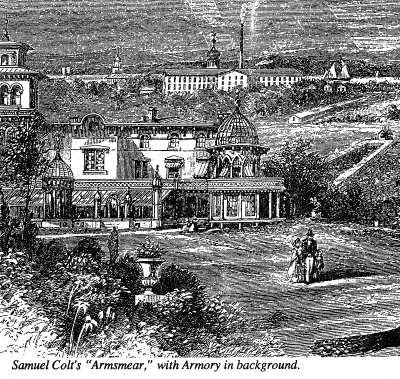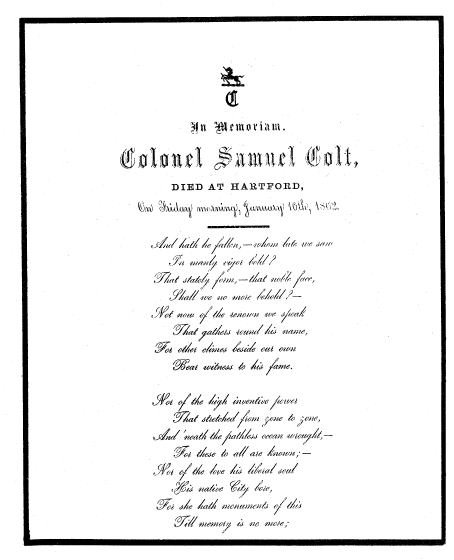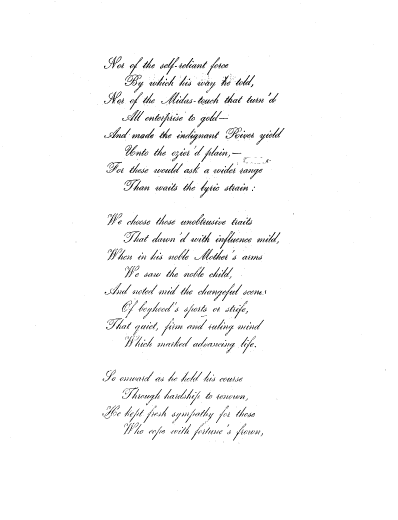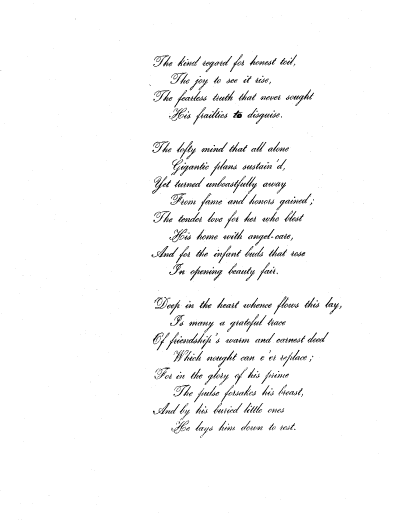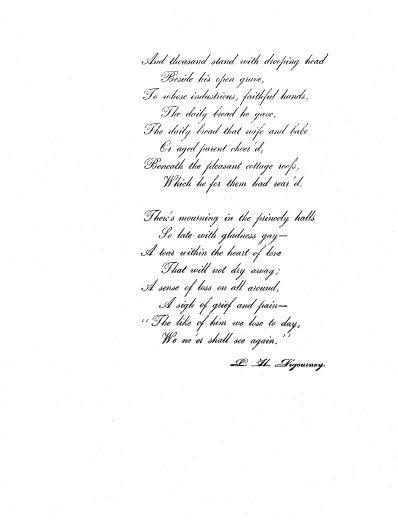Return to home page.
Contents
§ Statistics on Connecticut Industry, 1840 to 1900 - a few charts showing how production had changed dramatically in the second half of the 19th Century
§ "A Day at the Armory of 'Colt's Patent Fire-Arms Manufacturing Company," from United States Magazine, Vol. IV, No. 3 (March, 1857). This is illustrated with pictures from various sources.
§ A Sampler of Colt Advertising - a collection of ads Colt created as brochures and to run in magazines and newspapers
§ Colt and Congress - a collection of some key patents Colt received, along with an 1848 petition for a government contract
§ Petition of Samuel Colt for a government contract, December 12, 1848
§ Newspapers - page 2 of the Hartford Daily Courant, October 11, 1853, and page 2 of the Hartford Daily Times, October 6 and October 7, 1853.
§ Portions of the Manuscript U.S. Census Returns for Hartford, 1860, showing Colt's workers and families.
§ Portion of a payroll for Colt's cartridge works
§ "Special Order No. 94" - a report by army officers on the quality of Colt's weapons, 1860.
§ On the Eve of the Civil War - a collection of documents illustrating Colt's business ethics and relationship between business and politics.
§ Reactions to Samuel Colt - 2 fictional assessments of Samuel Colt by former Governor Thomas Seymour, and former Hartford city Councilman James Bolter, set in 1860.
§ Requiem - two post-mortem views of Samuel Colt, one by Lydia Sigourney, a poetess who lived in Hartford when Colt died, the other by Ellsworth S. Grant, a modern historian (used with permission of the author).
§ The "Laboring Class" - a set of tables from the First Annual Report of the Connecticut Bureau of Labor Statistics (1874) and Alba Edwards, The Labor Legislation of Connecticut, showing cost of living, wages, and hours figures of the late 19th Century.
§ Wages and Profits - excerpts from the Connecticut Bureau of Labor Statistics report for November, 1885, discussing the growing inequality of incomes in urban-industrial Connecticut. A chart also shows that women and children are becoming a significant part of the work force.
§ A Strike at Cheney Brothers - two documents illustrating attitudes about the strike at Cheney Brothers silk mills in 1902, with an introduction containing some background on Cheney Brothers.
§ The Growing Labor Movement (1878-1902) - Excerpts from the Labor Statistics report of 1902, containing a summary of efforts to organize laborers in Connecticut, and a discussion of "Strikes and Lockouts" during 1902.
§ Working Women - a chart showing the number of women in the work force in Connecticut, some interviews with working women, and women on strike.
This site was created by Mark Williams, a history teacher at The Loomis Chaffee School, Windsor, Connecticut, under a grant from the Connecticut Humanities Council. Some of the materials published here were originally created by Mark Williams as Connecticut Case Studies, under a grant from the Connecticut Humanities Council, and printed by the Hartford Steam Boiler Inspection and Insurance Company. John F. Sutherland of Manchester Community College, Ronald P. Dufour of Rhode Island College, Thomas P. Weinland of the University of Connecticut, Tracey Wilson of Conard High School, Robert K. Andrian of The Loomis Chaffee School, and State Historian Christopher Collier served as consultants. The Connecticut Humanities Council is the State Committee of the National Endowment for the Humanities. The viewpoints or recommendations expressed in the materials on this site of are not necessarily those of the Council or the Endowment. Teachers are encouraged to print and make copies of these materials for their students.
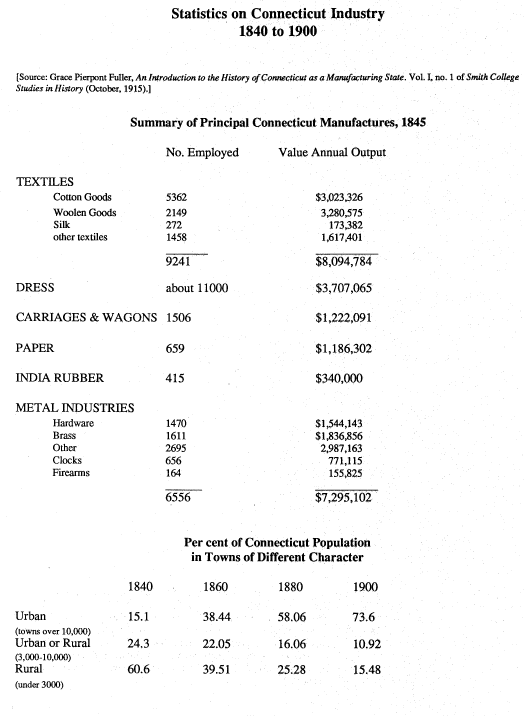
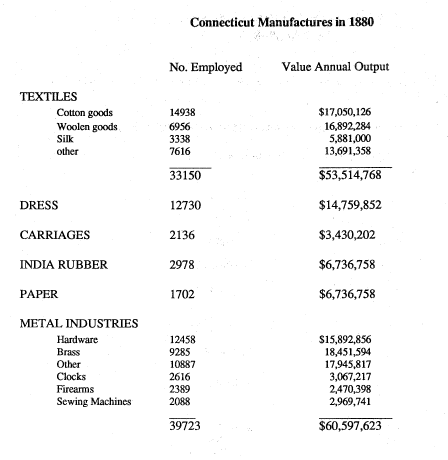
Return to Contents.
UNITED STATES MAGAZINE
Vol. IV]..............................................................March, 1857..............................................................[No.3
REPEATING FIRE-ARMS
_______
A DAY AT THE ARMORY OF "COLT'S PATENT FIRE-ARMS MANUFACTURING COMPANY"
It appears that, while a very young man, Mr. Samuel Colt had paid much attention to the subject of fire-arms. In his paper read before the Institution of Civil Engineers, in London, in 1851,...by far, the best account of this species of arms that has yet come under our observation,...he remarks, "The author, living in a country of most extensive frontier, still inhabited by hordes of aborigines, and knowing that insulated position of the enterprising pioneer and his dependence, sometimes alone, on his personal ability to protect himself and family, had often meditated upon the inefficiency of the ordinary double-barreled gun and pistol, both involving a loss of time in reloading, which was too frequently fatal in the peculiar character of Indian border warfare. By the United States Government, also, it was considered an object of great importance to obtain an effective repeating arm, as the peculiar characteristic of the mode of attack by the mounted Indians was to overwhelm small bodies of American soldiers by rushing down on them in greatly superior numbers, after having drawn their fire, and then to dispatch them, while in a comparatively defenseless state, from the necessity of reloading their arms. After much reflection and repeated trials, he effected an arrangement in the construction of revolving fire-arms, without having seen, or being aware, at that period, (1829,) of any arm more effective than a double-barreled gun having ever been constructed, and it was only during a visit to Europe, in the year 1835, that he discovered he was not the first person who had conceived the idea of repeating fire-arms with a rotating chambered-breech."
Undoubtedly the whole idea and construction of his wonderfully efficient weapon was entirely original with Colonel Colt, and most likely these are among the prominent reasons of the great triumph of his efforts. Had he been furnished with the results of those who preceded him, probably he would have too nearly followed in their tracks, and thus have been diverted from the goal of success. This hypothesis has, in a manner, been illustrated in some of the minor events of his life; and we understand that the theory now practiced by him is to depend solely on his personal resources. If he wishes to accomplish a certain object, let it be a new application of machinery, or what not, he desires no rehearsal of the efforts of others; but, in his own way, and by his own personal ingenuity the result is produced.
The original conception of Colonel Colt, in regard to fire-arms, was the combination of a number of long barrels to rotate upon a spindle, by the act of cocking the lock, in the same manner that they have since been made by others who claim to have originated the plan; but, as objections arose from the weight and bulk of the arm, in his study to obviate them, the idea of a single barrel, and a chambered breech suggested itself to him. Although, without the pecuniary means of then practically testing his convictions, he made a small wooden model of his conception, which he possesses at the present day. He then assiduously pursued his calling, as a scientific lecturer, and from its rewards procured the aid to manufacture specimen arms, which in their practical results exceeded even his own most sanguine expectations; and in 1835 he received his first patent from the Government of the United States.
After procuring his first patent, Colonel Colt's want for pecuniary aid placed him in the situation of most successful inventors, and his only course was to engage the attention of capitalists to form a company to make and introduce his arms to the public. His indomitable energy and well-known business perseverance soon accomplished this, and the Patent Arms Company was established in 1836, at Paterson, New Jersey. It continued in existence until 1842, when they were forced to suspend operations, after expending capital of over $300,000, without any beneficial results, except those gained in the further simplifying the mechanism of the arms and perfecting the machinery required for their manufacture....
The supreme authorities at Washington, and officers in the public service, both naval and military, frowned upon his invention. He used the percussion cap - a bad substitute, it was thought, for the old flintlock. His arms were more likely to get out of order than those of the old-fashioned construction, and when broken could not so easily be repaired as common arms. These were the main objections. But Colonel Colt, nothing daunted - for discouragement is no element in his composition - met the objectors by careful explanations, by numerous experiments, and, what is more, by making constant improvements upon his invention. There was no suggestion, of practical value, from boards of officers convened to examine and report upon his arm, or from other quarters, to which he did not give heed - no thought of his own in this connection which he did not test by experiment - the company of which he was the soul, - and the result was soon manifested in an arm so perfect in its construction as to rouse commendation wherever seen. Leading institutions and societies, within whose proper purview the arm came, and the journals of the country, to a great extent, vied with each other in its praise. The first premium of the American Institute, New York, and of the Mechanics' Institute in the same city, was, at several fairs, bestowed upon its inventor. Both Colt's pistols and Colt's rifles were eulogized generally as splendid specimens of ingenuity and skill - as surpassing in beauty and correctness of workmanship the best arms of European manufacture - as handled with the greatest facility and ease - as firing with astonishing precision - and as sending forth their successive messengers of death with marvelous celerity, force and effect. These justly merited commendations - and, what is of weightier importance still in this connection, the practical experience of military men, to a large extent, of the value of these arms - upon the battle-fields of Texas, in the everglades of Florida, and amid the fortresses and over the plains of Mexico - finally commended their adoption by the Government of the United States. The testimony in their favor of such men as General Rusk and General Houston, of Commodore Moore, of the Texan navy, of Jack Hayes, Ben. McCulloch, and numerous other gallant officers of the far famed Texan Rangers, and of that brave and excellent officer, particularly, Colonel Harney, the Murat of the American army, could not be resisted. We use them "with the greatest possible success," they all affirmed. "They have far surpassed our expectations. We would not be without them for the world!"
From the period of this adoption of his arm, the prosperity of Colonel Colt - as was his just meed after years of toil, of trial, of disappointment, but never of failure of hope, or abatement of industry - has run on in one limpid, sparkling, and unbroken stream. By contract demands for his arms from Texas - which he fulfilled, with straitened means, at Whitneyville, Connecticut - by contract demands also from the United States - he was enabled to transfer his enterprise to Hartford, his own native town, upon the banks of the Connecticut, where he has at last succeeded in founding an armory, the most magnificent of its kind, it may be safely alleged, in the known world - an establishment, built in the first place by damming out - in a project deemed by many, in its inception, almost superhuman - the waters of the mighty Connecticut in their maddened freshet time - which incorporates, in buildings and machinery, a full million of dollars - which give employment to from six to eight hundred men inside the main building, and to numerous hands outside, - which dispenses daily, in wages alone from one thousand to fifteen hundred dollars, and manufactures, year by year, from seventy-five to one hundred thousand arms not confined to the United States, but extending over both the Americas - more or less to the Indies, East and West - to Egypt - even to distant Australia - to remote Asiatic tribes assembled at the great Fairs of Novgorood, and over Europe generally, but especially to England. Here the arms of Colonel Colt, first introduced in splendid style through the World's Fair, were warmly welcomed, and led to the speedy establishment in London of an extensive armory for their manufacture, and to their rapid adoption into the British army and naval service.
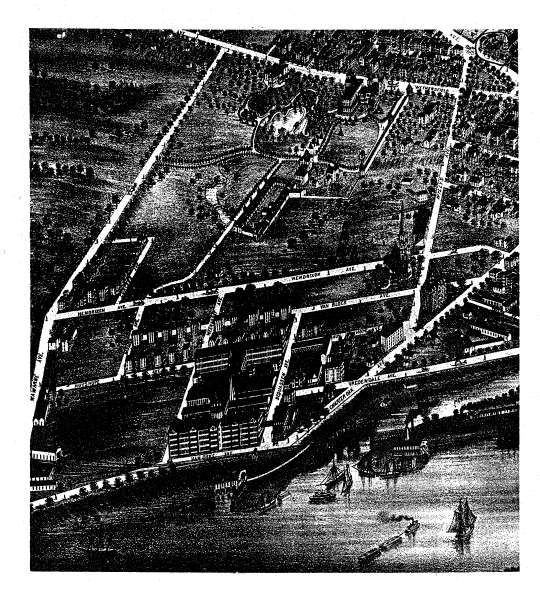
Within the corporate limits of the City of Hartford, immediately below the Little or Mill River, is a section land, containing about 250 acres, which, owing to its formerly being submerged at the periodical freshets of the Connecticut River, was available at certain seasons only, and then but for grazing. Colonel Colt selected and purchased this spot as his field of operations. His first move was to erect an embankment, or dyke, by which the waters of the Connecticut were entirely and permanently excluded; thus reclaiming the land for building purposes or tillage, as might be desired. This embankment is about two miles long, averaging over one hundred feet wide at the base, and over forty feet in width at the top, and from ten to twenty feet in height. It is built in the most substantial manner, the sides being covered with osier, both for protection and ornament, and for material for his willow works factory, for which he has brought fifty skilled craftsmen from Germany and plans to build for them Swiss-chalet style houses called the Potsdam village. From the smoothness of the road on the dyke, and the beautiful scenery in the vicinity, the dyke has become the fashionable drive of the citizens.
That the operations might be on the most extended scale, and also that the proprietor might have the undivided exertions of his principal assistants in the manufacture, an association was now formed under a special law from the state, styled "Colt's Patent Fire-arms Manufacturing Company." The stockholders in the company are few, Colonel Colt being largely the principal, and the others the heads of the various departments of the business. The capital is $1,250,000; the whole of which is invested in the buildings, tools, machinery, raw materials, etc....The new armory...was finished and operations commenced in it in the Fall of 1855.
The motive power is located about in the center of the main building. It consists of a steam engine - cylinder, 36 inches in diameter, 7 foot stroke, fly-wheel 30 feet in diameter, weighing 7 tons. This engine, which is rated at 250 horse power, is supplied with the well-known "Sickel's Cutoff," which the superintendent and engineer speak of as the most useful and important addition to the steam-engine since the days of Watt. The steam is furnished from two cylindrical boilers, each 22 feet long and 7 feet in diameter. The power is carried to the attic by a belt working on the fly-wheel; this belt is 118 feet long by 22 inches wide, and travels at the rate of 2,500 feet per minute.
Fully appreciating the great interest manifested by our readers in descriptions of this kind, we will now proceed to conduct them through the interior of this immense industrial pile, and on the way we will endeavor to explain, as understandingly as possible, the various processes of the manufacture, from the raw metal and wood, to the complete and effective arms familiarly known as Colt's Revolvers.
Leaving the office we cross the bridge, pass down through the machine shop, engine room, etc., to the rear parallel, an apartment 40 by 50 feet square, the center of which is appropriated as the store-room for iron and steel. Large quantities of these materials, in bars and rods, are stored here in charge of a responsible party, whose duty it is to fill the orders from the contractors, and render an accurate statement of such deliveries to the main storekeeper's department. This latter system is universal throughout the establishment - thus the materials of all kinds can be readily accounted for, no matter what their state of transposition.
We now follow them to the armory proper, which, in the first place, is the second story of the front parallel. This is probably not only the most spacious, but the best arranged and fitted workshop extant. We fully understand this to be a broad and sweeping assertion, yet we have an abundance of competent authority to back the opinion. On first entering this immense room, from the office, the tout ensemble is really grand and imposing, and the beholder is readily impressed with an exalted opinion of the vast mechanical resources of the corporation. The room is 500 feet long by 60 feet wide, and 16 feet high. It is lighted, on all sides, by 110 windows that reach nearly from floor to ceiling; it is warmed by steam from the boilers - the pipers being under the benches, running completely around the sides and ends; there are the perfect arrangements for ventilation, and sufficient gas burners to illuminate the whole for night-work. Running along through the center is a row of cast-iron columns, sixty in number, to which is attached the shafting - which here is arranged as a continuous pulley - for driving the machines, as close together as possible, only allowing sufficient space to get around and work them. The whole of this immense floor space is covered with machine tools. Each portion of the fire-arm has its particular section. As we enter the door the first group of machines appears to be exclusively employed in chambering cylinders; the next turning and shaping them; here another is boring barrels; another group is milling the lockframes; still another is drilling them; beyond are a score of machines boring and screw-cutting the nipples, and next to them a number of others are making screws; here are the rifling machines, and there the machines for boring rifle-barrels; now we come to the jigging machines that mortice out the lock-frames; and thus it goes on all over this great hive of physical and mental exertion.
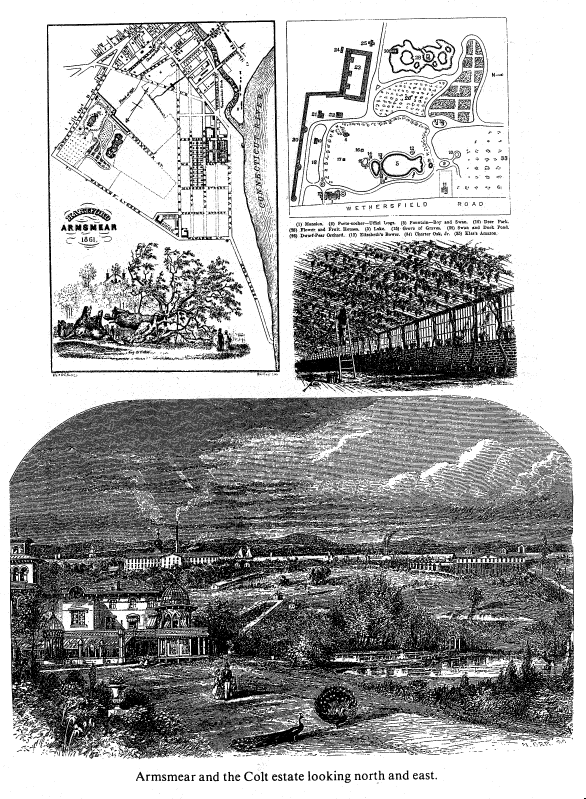
As soon as completed the different parts are carried to the story above, which, with the exception of the machinery and the columns through the center, is an exact counterpart of the room below. It is designated the Inspecting and Assembling Department. Here the different parts are most minutely inspected; this embraces a series of operations which in the aggregate amount to considerable; the tools to inspect a cylinder, for example, are fifteen in number, each of which must gauge to a hair; the greatest nicety is observed, and it is absolutely impossible to get a slighted piece of work beyond this point.
The finished arm is laid on a rack, ready for the prover; of course many others accompany it to the department of this official, which is located in the third story of the rear building. Here each chamber is loaded with the largest charge possible, and practically tested by firing; after which, they are wiped out by the prover and returned to the inspection department. The inspectors again take them apart, thoroughly clean and oil them, when they are for the last time put together and placed in a rack for the final inspection. This is done by Mr. William Tuller, a gentleman who has been in the constant employment of Colonel Colt since the manufacture commenced in Hartford. The parts having been so thoroughly examined and tested, it would seem that this last inspection was scarcely necessary; but, after a short observation, we saw several laid aside. Taking up one with a small mark on the barrel, "Why do you reject this?" we inquired. "Pass that to-day, and probably much larger blemishes would appear to-morrow," replied Mr. T. The order from the Principal is perfection; and a small scratch in the bluing or varnish is sufficient to prevent the arm passing. The finished arm is now returned to the store room; from whence, after being papered, they are sent to the wareroom - situated in the basement of the office building; from this they are sent to nearly every portion of the habitable globe.
In round numbers it might be stated that supposing the cost of an arm to be 100; of this the wages of those who attended to and passed pieces through the machines was 10 per cent, and those of the best class workmen engaged in assembling the weapons was also 10 per cent, thus leaving 80 per cent for the duty done by the machinery.
With the exception of the steam engine and boilers, a majority of the machinery was not only invented, but constructed on the premises. When this department was commenced, it was the intention of the Company to manufacture solely for their own use. Some months since, applications were made by several foreign Governments to be supplied with machines and the right to operate them. After mature deliberation, it was concluded to supply orders, and on the day of our visit we saw a complete set of machinery for manufacturing fire-arms, that will shortly be shipped to a distant land. The Company have now determined to incorporate this manufacture as a branch of their regular business. The machine shop is the lower floor of the front parallel; its dimensions are 60 by 500 feet; it is supplied with power and hand tools of every desired kind, all of the most approved construction.
Another of the numerous inventions of Colonel Colt is the Metallic Foil Cartridge, a contrivance that always insures "dry powder' to the possessor. Tin foil, cut in the required shape, is formed in an inverted cone, which is charged with gunpowder; the ball is oval, with a flat end; a circle is pierced near the edge, on this flat end, to receive the edge of the foil; on the cone and ball being brought together, the joint is closed by pressure; they are then inclosed in paper wrappers, so arranged that this covering can be instantly removed when the cartridge is about to be used. The whole operation is completed so perfectly that the cartridge is entirely impervious to water, as by experiment they have repeatedly been fired after having been immersed for hours. Owing to the peculiar shape of the bore of the nipple in Colt's firearms, the fire from the percussion caps readily penetrated the foil, without pricking.
They are manufactured in a building erected expressly for the purpose, situated about half a mile south of the armory. No fire is allowed in any part of the works, heat being furnished by steam generated in an out-building. Nearly the whole labor here is performed by females, about thirty of whom were at work during our visit - the foreman, engineer and charger making the complement of employees.
The principal officers of the company consist of Colonel Colt as President; E. K. Root, Esq., Superintendent, and Luther P. Sargeant, Esq., Treasurer and Secretary; besides these, there is a chief to each department - Mr. Horace Lord being master workman in the armory. Colonel Colt has been particularly fortunate in the selection of his immediate associates; they are all men of mark. Mr. Root, to whom we are indebted for a few hours of valuable instruction, is one of the most accomplished, practical and scientific mechanics of the day; although only in the prime of life, he has established a most enviable position, and his opinions on mooted questions of mechanism are eagerly sought after, even by the principals of some of our most extensive city establishments. Colonel Colt informed us that since their first connection all his views had been most ably seconded and put in practical operation by Mr. Root. In fact, the whole manufacture of every description is under his immediate direction.
Although so much care and attention have been exercised in perfecting the armory, its accessories and products, yet the general welfare of the employees has not been neglected; most extensive arrangements for their comfort and convenience are in the course of rapid completion. And we may here remark that they are deserving of such especial favor; as a body they are mostly young men, many of them having commenced their business life in the establishment. It was, in a measure, necessary to educate men expressly for the purpose, as the manipulation required is not exclusively that of the gunsmith, or of the machinist, but a combination of both of these callings. Taken as a whole, we found them decidedly a reading and thinking community, and we venture the assertion, that it would be difficult to produce a counterpart of mental capacity in the same number of mechanics employed in a manufactory. That they are well compensated for their services is evinced from the fact of the pay-roll amounting to from $1,000 to $1,200 per day.
The grounds around the armory have been laid out in squares of 500 feet each by streets 60 feet wide; upon these squares are being erected commodious three-story dwellings. Sufficient for about eighty families have already been finished, and are occupied by the employees; the operations will be continued until all who desire are accommodated. These houses have all the conveniences of city life. Gas works, of sufficient capacity to supply as large a population as can occupy the area, have already been erected and put in operation. Attached to the engine in the main building is a "cam pump," which raises the water from the Connecticut to a reservoir on the hill beyond, from which it is distributed, by pipes, to the armory, dwellings, etc....One of the buildings is a beautiful structure known as Charter Oak Hall - so named from its being located on the same avenue as the venerable and time-honored tree, which for centuries braved the storm, and from a singular incident became celebrated in our colonial history. This hall is employed by the operatives for lectures, debates, concerts, balls, etc. The festive occasions are enlivened with music from a band organized from their midst - the instruments, which are most excellent, having been furnished though the liberality of Colonel Colt. A public park, fountains, etc., are in the plans, all of which are being successfully executed.
On the hill overlooking the whole is the palatial residence of the proprietor. It is really a superb edifice, the main building being fifty by one hundred feet; it is in the Italian villa style - the ground and out buildings being on the scale which would naturally be expected of a man of his extended views and liberal taste.
The marvelous extension of use of Colonel Colt's revolver within a few years, in Europe, and over parts of Asia - the establishment by the British Government of an armory of its own at Enfield, for its manufacture - the establishment of another by the Russian Government at Tula for the same manufacture - the call upon Colonel Colt, aided in part by some other American establishments, to provide all the important machinery for these new armories - these facts and hosts of testimonials from all parts of the world, and from the highest sources, attest the unrivaled excellence of the repeating arms of Colonel Colt, and rank him among the most remarkable inventors of the world.
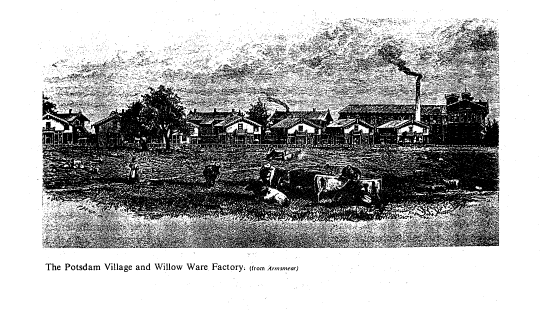
Return to Contents.
A Sampler of Colt Advertising
Samuel Colt was famous for his flashy and innovative advertising. He believed that having a good product was not enough, - success would be determined by the salesmanship. Following is a a collection of advertisements he ran in newspapers and magazines, and sent out as brochures.

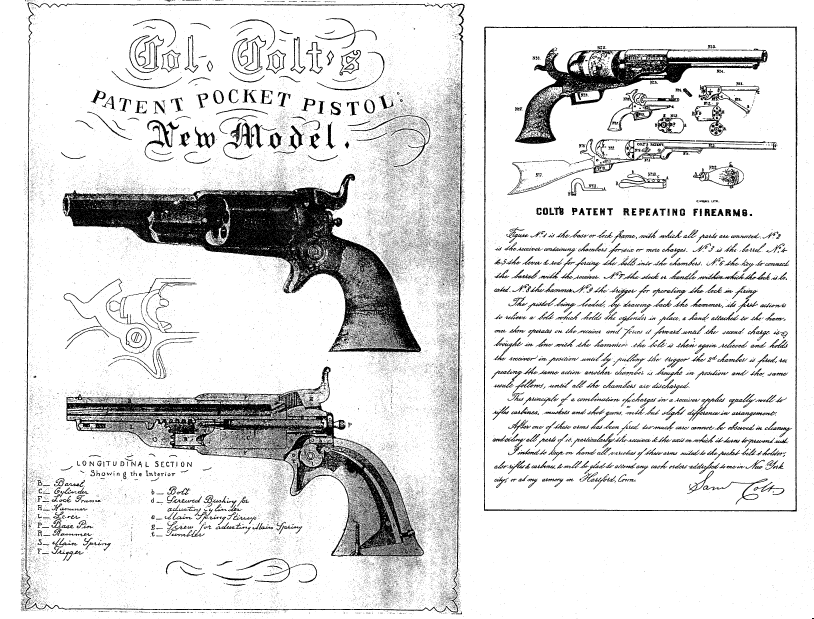


Return to Contents.
Colt and Congress
Samuel Colt probably worked his hardest when dealing with the United States Congress. Congress held the key to his patent privileges, which protected his right to be the only manufacturer of his inventions. Congress also had the power to appropriate funds for the military to purchase weapons, and the government (and governments around the world) was to become Colt's biggest customer. The following pages contain some examples of patents held by Colt's company on improvements made on his products by himself and master machinists in his employ, such as Elisha Root.
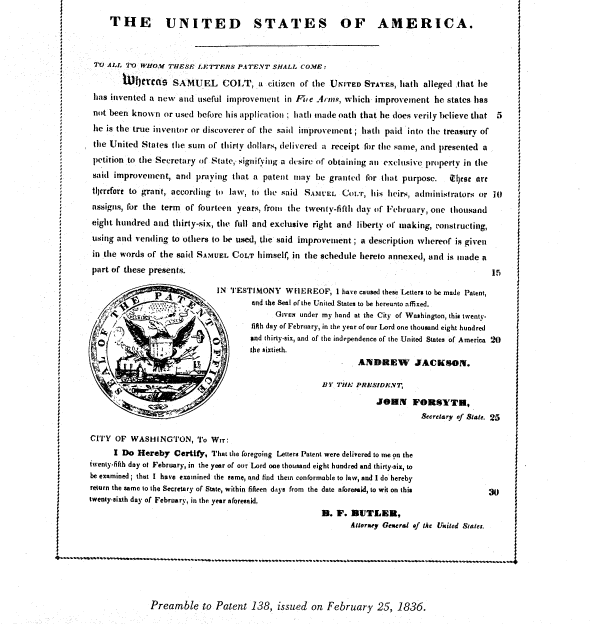
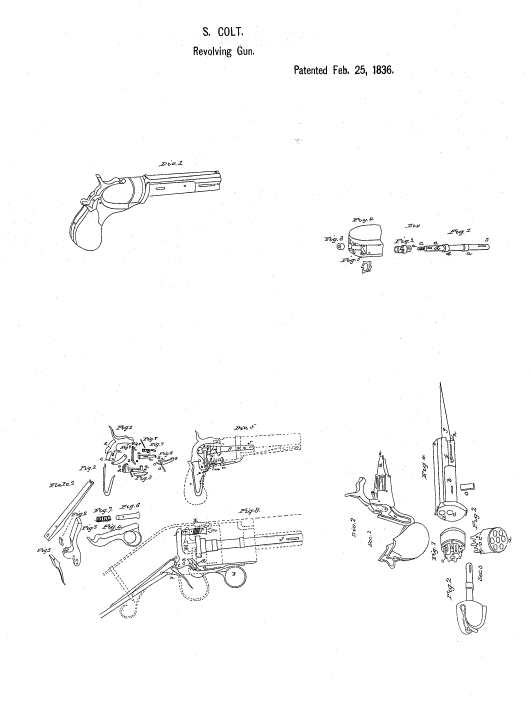
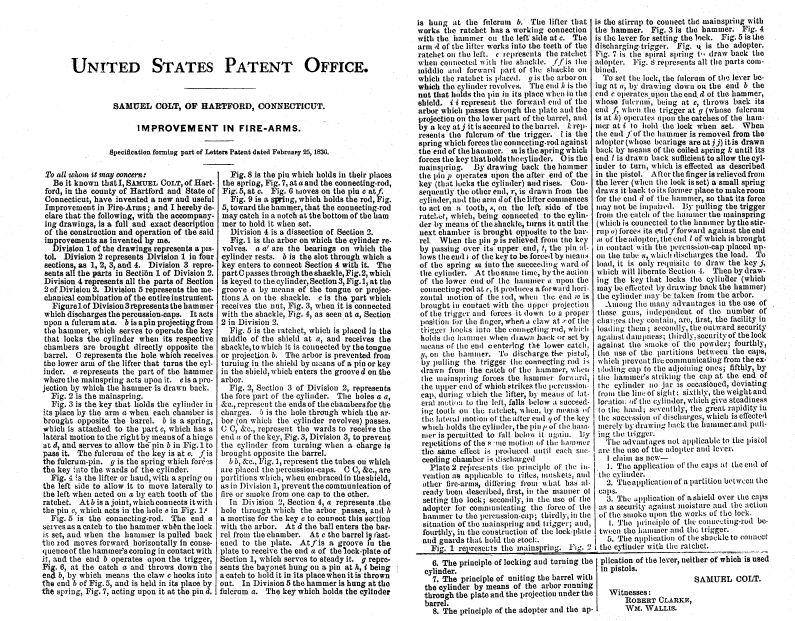
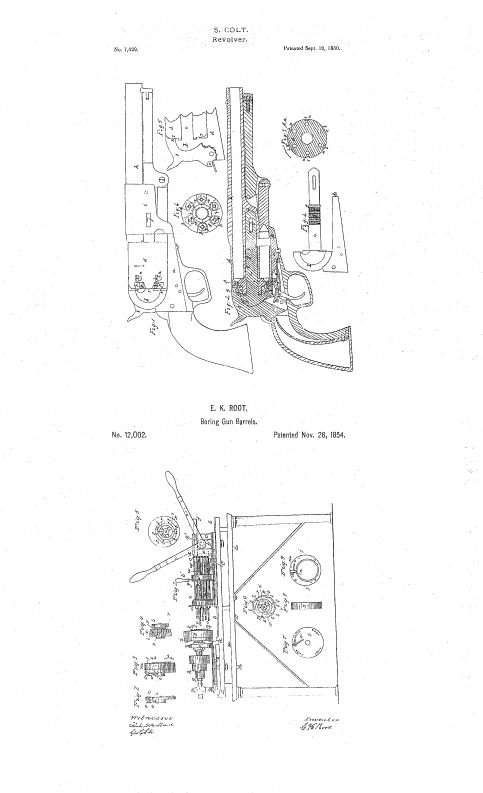
Return to Contents.
A Petition for a Government Contract

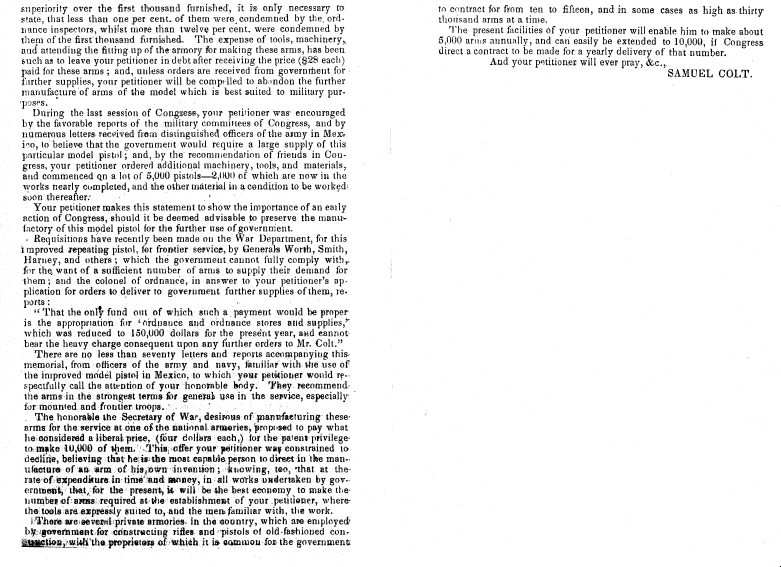
Return to Contents.
News Items: Colonel Colt's Proposals
(excerpts from The Hartford Courant and The Hartford Times)
Return to Contents.
Selections from the Unites States Census
(Manuscript Census - 1860)
Below is a listing of the people who lived and worked around and in Colt's Armory when the census was taken in 1860. Using this list you can tell who were Colt's employees, and develop some understanding of what their lives were like. At the end of this list are also some other families who lived nearby, but did not work at Colt's. Family members are indented under the name of the head of the family.
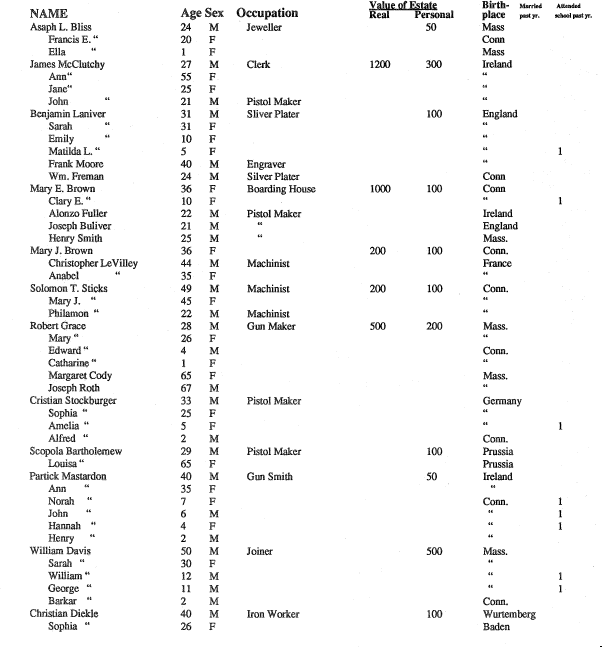
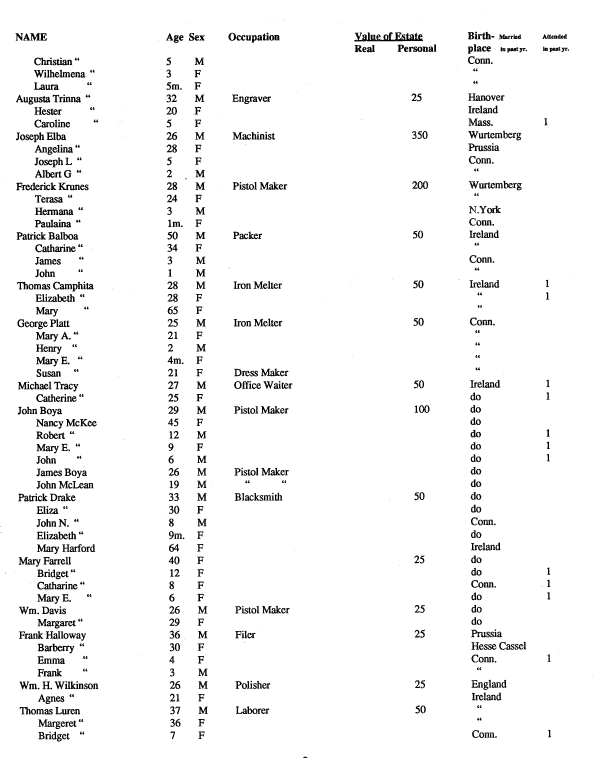
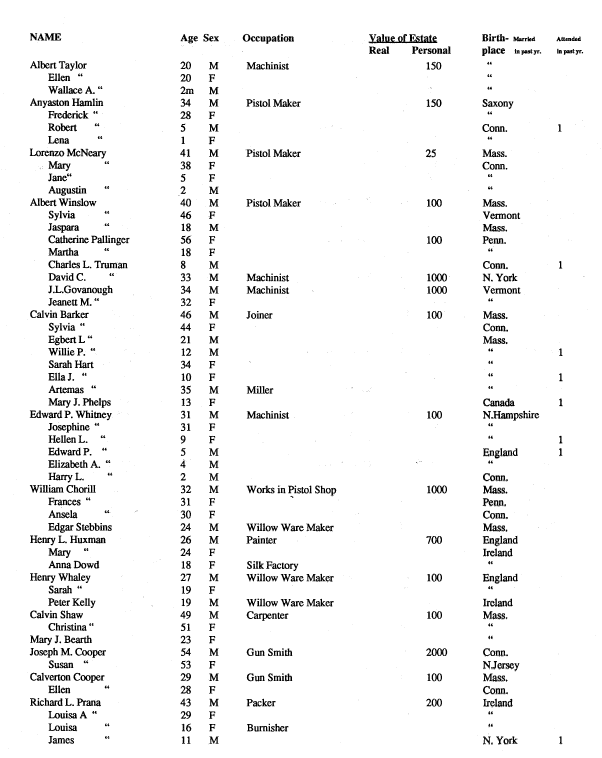
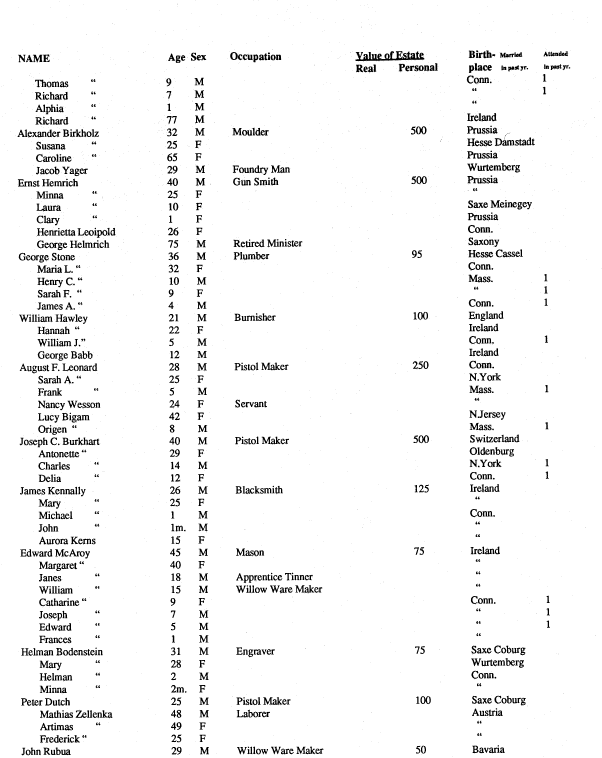

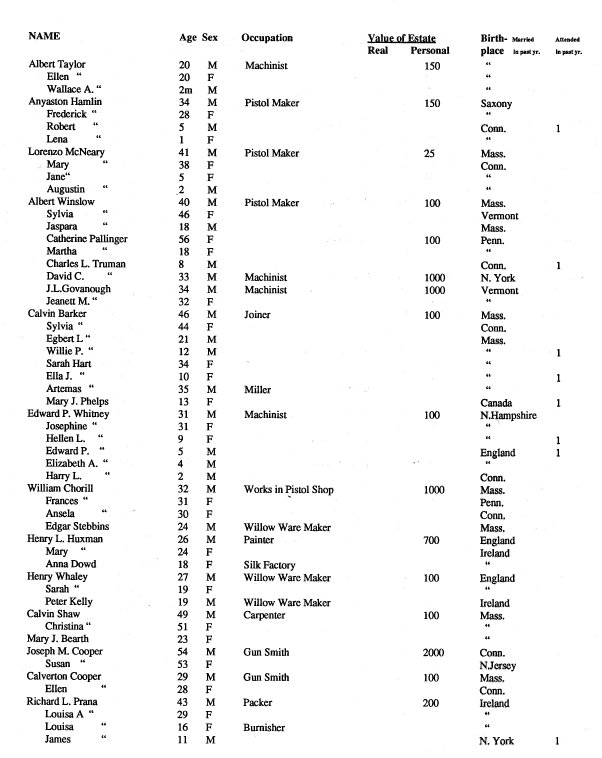
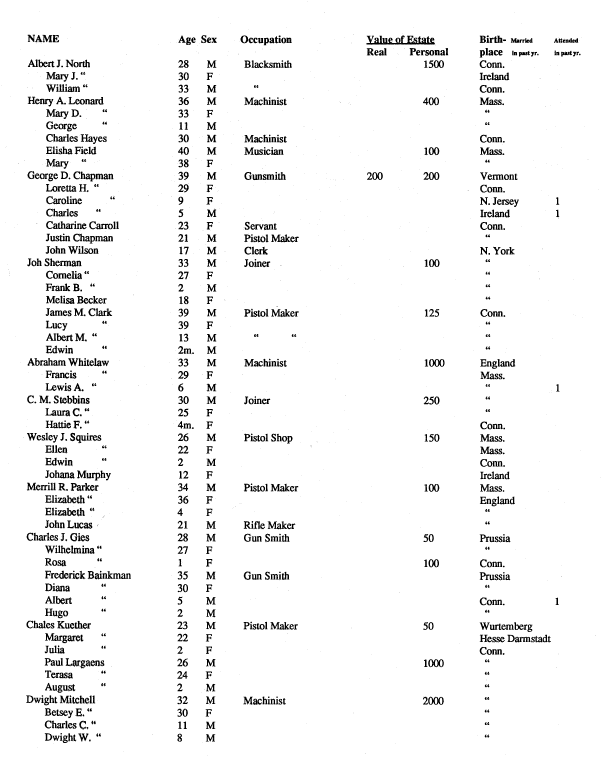
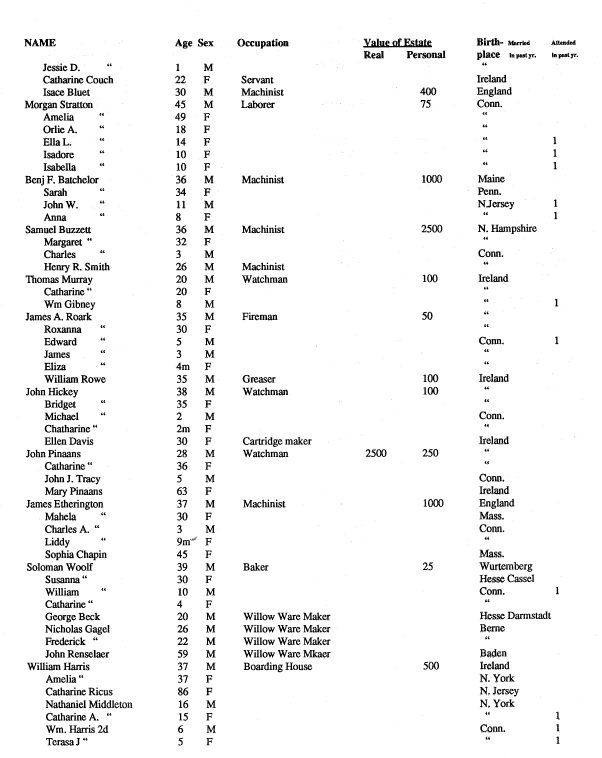
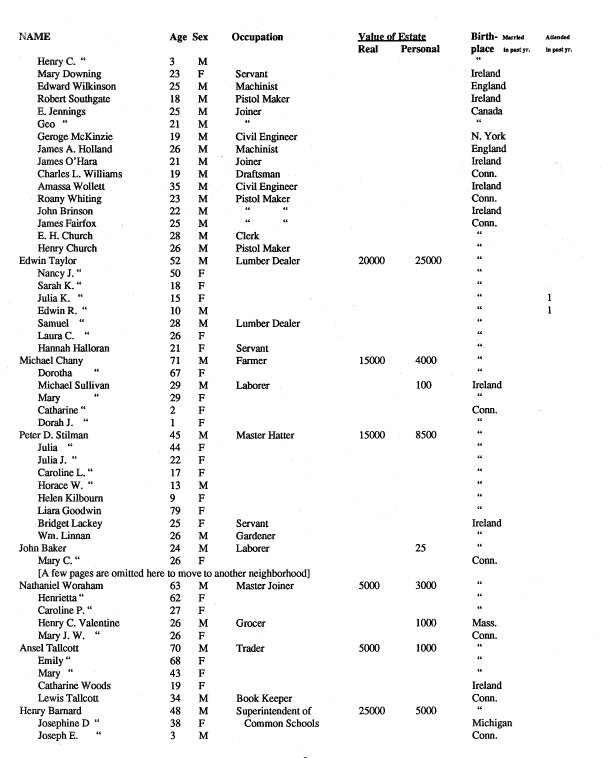
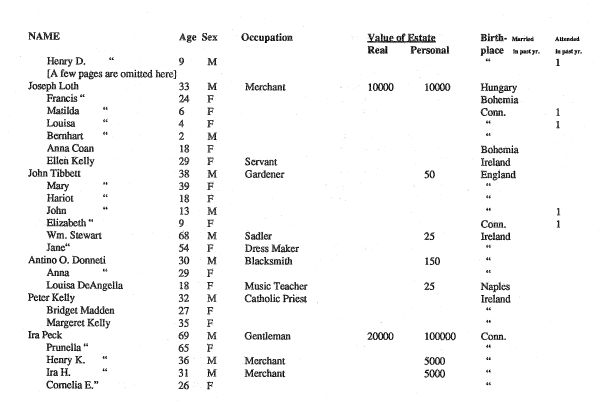
The Census does not end here, but there is enough here to get a good sense of the workers who lived around Colt's armory, as well as the sort of people who lived in some of the other neighborhoods nearby.
Return to Contents.
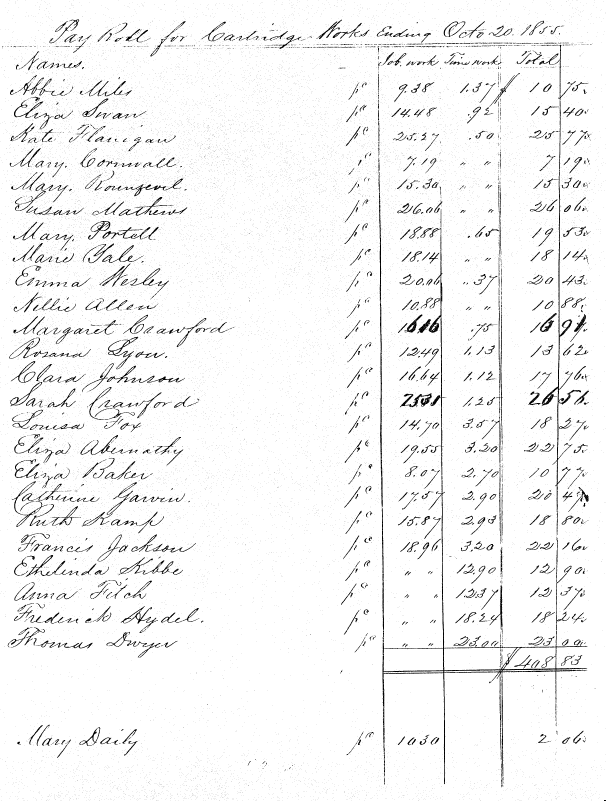
Return to Contents.
SPECIAL ORDER, NO. 94
War Department, Adjutant General's Office,
Washington, May 18th, 1860
A Board of Officers, to consist of Brevet Colonel J.E.Johnston, Lieut. Colonel First Cavalry; Major W. H. Emory, First Cavalry; Captain W. Maynadier, Ordnance Department; Captain J. W. Davidson, First Dragoons; will assemble at the Washington Arsenal at 10 o'clock a.m., to-morrow, or as soon thereafter as practicable, to examine and report upon certain improvements recently made in Colt's Revolving Fire Arms.
The junior member of the Board will act as Recorder.
By order of the Secretary of War, E.D.Townsend
Assistant Adjutant Gen'l.
To Col Samuel Colt, Hartford, Conn.
_______________
Washington Arsenal, D.C., May 19, 1860
The Board of Officers appointed by Special Order No. 94 "to examine and report upon certain improvements recently made by Colt's Revolving Fire Arms," having made the examination as directed, submit the following Report:
The improvement, as claimed by Mr. Colt, consists in diminishing the weight of his Revolver known as the Dragoon or Holster Pistol, and retaining the same calibre, thereby securing as great efficiency of fire, without the disadvantages heretofore found in carrying and handling the heavier pistol of that description. The Board first made a careful examination of the Improved Revolver, from which they are convinced that it possesses decided advantages over that which it is designed to supersede not only from its reduced weight, but also from its superior model, which is apparent at first view. There were two Revolvers of this model presented for examination, differing only in the length of the barrel; one being 7 1/2 inches long, the exact length of the old model; the other half an inch longer, or eight inches in the barrel.
The following are results of trials made by the Board, for the purpose of ascertaining the comparative practical efficiency of the present and the Improved Revolvers, and also of the improved 7 1/2 and 8 inch barrels, as compared with each other:
|
|
Ration of Penetration
|
Ratio of Accuracy
|
Weight
|
|
Old Model, 7 1/2 inch barrel
|
1000
|
1000
|
4 lbs. 2 ozs.
|
|
Improved Model, 7 1/2 in.barrel
|
1133
|
0950
|
2 lbs. 8 ozs.
|
|
Improved Model, 8 in. barrel
|
1333
|
1050
|
2 lbs. 8 ozs.
|
The same kind of cartridges, loaded in the same way, were used; the targets and distances were the same for all the firings by which these ratios were determined. It may be proper to remark, that the circumstances attending the firing, for accuracy were rather more favorable for the old than the new model, the former having been fired with a cloudy sky, and in a calm, while the latter was fired in a strong light, and with a smart breeze across the line of fire.
To ascertain the strength of the New Model Pistols, the chambers of each were loaded with Government powder to their utmost capacity, so as to admit the insertion of an elongated ball, which was rammed firmly over the charge. They were fired with these proof charges, without any injury resulting. In order to ascertain whether any injury might result from using, either accidentally, or from necessity, the carbine cartridges (for different arm of the same calibre,) in the new model pistols, they were loaded with such cartridges and fired without any injury to the arms; the only difference being an increased ratio of penetration. The arms were loaded and capped and then loose powder was scattered around the percussion caps, and also around the balls, when they were so fired without producing any premature discharge, or communication of fire from one chamber to another.
The results of all the examinations and trials by the Board, leave no doubt in their minds of the decided advantages which Mr. Colt has gained for his pistol by the introduction of his recent improvements. The superiority of Colt's Revolvers, as an arm for cavalry service, which has been so well established, is now finally confirmed by the production of the new model with the 8 inch barrel. There are a few minor points requiring modification, to which the manufacturer's notice has been called, and to which he should be required to attend in any arms he may furnish for the Government use. With these modifications, the Board are satisfied that the New Model Revolver, with the 8 inch barrel, will make the most superior cavalry arm we have ever had, and they recommend the adoption of this New Model, and its issue to all the mounted troops.
The Board having concluded the duty for which it was ordered, adjourned "without day."
J.E.Johnston, Acting Inspector General
W.H.Emory, Major First Cavalry
Wm. Maynadier, Captain of Ordnance
J.W. Davidson, Captain First Dragoons
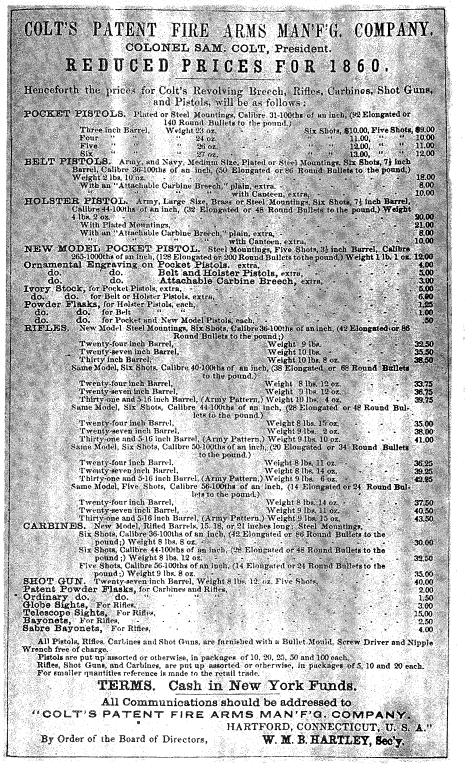
Return to Contents.
On the Eve of The Civil War
This collection of documents provides some insight into Samuel Colt's business practices, and the extent to which he would sell his arms to any buyer. It also contains hints of the relationship between business and politics where Colt was concerned. The year is 1860, shortly after the execution of John Brown, the radical abolitionist who conspired to incite a slave revolt in Virginia by capturing the arsenal at Harper's Ferry. The slave states reacted with great alarm, and talk of secession filled the air, as the intensely divided political parties began to search for presidential candidates. The first letter is from Bedney F. McDonald, an official in the Georgia state government, to Colt in Hartford. It contains a reference to Colt's standard practice of giving a set of engraved pistols to potential customers. Some of these pistols had "Charter Oak Stock" carved on the handle, alluding, no doubt to Colt's having purchased the famous carved chairs made by John Most from the wood of the Charter Oak that had been struck by lightning in 1855. The chairs had originally been for the city's Common Council, but the Council had deemed Most's bill too high, and Colt had indignantly bought them for his "Charter Oak Hall."
Marietta, Georgia
January 25, 1860
My Dear Colonel:
I have received your very fine presents of pistols, etc. and Mr. Goodman's note communicating the information to me that they had been forwarded by express. You will please accept my sincere thanks with the renewed manifestation of your kindness and friendship for me. Major Cooper, to whom I gave a letter of introduction to you has written me since that time that he is anxious that you should either establish or aid in establishing an armory in the state and believes that it would be to your interest to do so and has requested me to submit that matter to your consideration. I immediately addressed him a note requesting him to give me a full account of his locality and the facilities afforded by it for such an establishment. I had heard before that it contained many and great advantages for such a project. I shall enclose a letter in reference to this subject to you in a few days to Colonel Cooper who will deliver it to you in person I hope. I have no doubt that the undertaking would result in mutual profit to my state and yourself but I know it must meet the sanction of your excellent judgment before you engage in it. Allow me to say it would be most grateful to me to know that you approved it as it would afford a frequent opportunity of seeing you. My father, Governor McDonald, who resides at this place requests me to say that he will be most happy to see you at his house if you visit this section of the country and I hope you will not fail to call and see him and make his home your "headquarters" if you should come this way. Permit me to assure you if I can serve you in any way it will give me the greatest pleasure and I hope you will not fail to command me. I am, with the greatest respect,
Truly your friend and obedient servant
[s] Bedney F. McDonald
P.S. Direct your next communication to me at Blairsville, Union County, Georgia.
The next document is a letter written by Colt to Richard Jarvis, whom Colt had put in charge of the Armory while he vacationed in Cuba. He was suffering from inflammatory rheumatism, and hoped to "improve" in the tropics.
Havana
February 18, 1860
My Dear Sir:
We have just all landed here safe and sound and improve the minute to say I drew a check for $30,000 while in New York in favor of the cashier of the Mechanics Bank which please enter upon your checkbook and charge the same to my private account.
We have had a long but pleasant passage and I have been improving ever since we got into warm weather, the third day out, since when the thermometer has been at 70 degrees and above. I learned that it has been so high as 86 degrees here in Havana and we may expect to find it even hotter than this soon.
Say to Mr. Root and Mr. Lord that they must do their best to turn off our arms. Run the armory night and day with double sets of hands until we get 5,000 or 10,000 ahead of each kind. I had rather have an accumulation of our arms than to have money lying idle, and we cannot have too many on hand to meet the exigencies of the time and it is not unlikely we will soon be changing to the machinery of the plain rifles with the sword bayonet, as well as larger supplies of arms which are much wanted now, judging from the news I have received from New Orleans since I arrived. Make hay while the sun shines.
[s] Samuel Colt
P.S. You must write to me by every steamer and send regular reports of everything transpiring of the least interest. Always report the balance of money in bank, the number of kinds of arms sent to agencies in New York and elsewhere, also the number and arms furnished and on hand at the Armory. The news we get here from New Orleans is very war-like and I am sure there is a market for all the arms we can make, whether there is a fight or not. Now again I say to Root and Lord, keep on the work with all the forces that can be employed night and day.
I shall probably go to the hot sulpher springs some fifty miles from here in a few days and your letters will be forwarded to me there, if directed to me, simply "Colonel Samuel Colt, Havana, Cuba." In haste,
Yours
[s] Sam Colt
This editorial is taken from the New Haven Journal of March 8, 1860.
GAMMON - the Hartford Times hypercritically represents that Colonel Sam Colt has been obliged to discharge some of his firearms workmen, on account of the falling off of his Southern orders. This is running a thing into the ground. Some people may be fools enough to believe that the Southerners are running around barefoot for the pleasure of starving Massachusetts shoemakers, but it will be difficult to find anyone credulous enough to think that they have patriotically dispensed with firearms as preliminary to a forceful dissolution of the Union. As a matter of fact, Virginia is today arming its militia with Colt arms and has appropriated five hundred thousand dollars for the purpose. We saw twenty-five hundred dollars worth issued to a single company recently and the complaint there is that they cannot get them fast enough. The Times hopes to scare some of Colt's workmen into voting the "shamocratic" ticket and therefore it perpetrates its foolish falsehood.
Colt had been accused on numerous occasions of unfairly influencing his workers to vote for Democratic candidates in state and national elections (even to the point of having ballot boxes watched by his operatives). To those charges Colt had responded,
In no case have I ever hired an operative or discharged one for his political or religious opinions. I hire them for ten hours labor...and for that I pay them punctually every month....
The following brief note was written late in 1860 from Colt to one of his sales agents in Hartford. At the time Colt was in Washington, D.C. trying to secure a renewal of a patent. South Carolina had already seceded upon news of Lincoln's election.
My Dear Harbison:
I omitted in my last letter to answer your query as to the arms for North Carolina. The stipulation as to the inspection is nothing new, than that we will replace any pistol that may prove defective. The arms are to be paid for before shipment and at the time of shipment in New York. I see no objections to the shipment. North Carolina has not seceded and not likely to, unless the new administration adopts the policy of coercion, which is not probable. I hope to get through here in a few days but cannot turn my back on the place until this Tariff bill and Patent bill have passed and if I fail on the latter, I shall try to have it tacked to the Army appropriation bill or some other.
[s]Samuel Colt
Colt was very much opposed to Lincoln's election, and worked actively to prevent it, in spite of his public denials of pressure on his workers. As he wrote a friend a few months before the election, he thought all his fellow manufacturers ought to discharge from our imploymen every Black Republican...until the question of slavery is for ever set to rest & the right of the South secured permanently to them. With the Union destroyed, Colt felt he would lose some good customers. In actuality, after 1860 the Armory's earnings went from an average of $237,000 per year to over a million. His last shipment of guns to the South was dispatched to Richmond three days after the fall of Fort Sumter, their boxes clearly marked "hardware."
Return to Contents.
Reactions to Samuel Colt:
Thomas Hart Seymour
|
Born in Hartford, Sept. 29, 1807, 2nd child of Major Henry Seymour and Jane Ellery, and descendant of Richard Seymour, one of the first settlers to Hartford in 1635 and later a pioneer to Norwalk.
Educated in Hartford and at Capt. Partridge's military school in Middletown.
Studied law in Hartford and admitted to the bar in 1833.
Commander of the Governor's Foot Guard in the 1830's.
Editor of a Democratic newspaper The Jeffersonian, 1837-1838.
Judge of Probate in the 1840's.
1846 commissioned a Major of the 9th New England Volunteers in the Mexican War, where he performed with distinction after taking over as regimental commander for Col. Ransom who fell at Chapultepec.
Ran for governor 1845 and 1849 unsuccessfully. Elected 1850 by a large majority, and reelected 1851, 52 and 53.
President Franklin Pierce appointed him to be minister to Russia in 1853, where he became a close friend of the Czar and his son.
Returned to Hartford in 1859. Campaigned in 1860 for Stephen Douglas.
Member of Washington Commandery and Knights Templar at Hartford.
|
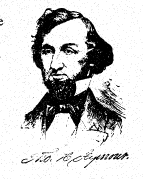
|
When I think of Col. Sam Colt (and, by the way, it was I who bestowed the title of "Colonel" upon him when I was Governor), I think only in terms of prosperity and greatness for this state. What that gentleman has done for this state has been matched by few except for such as Hooker, Trumbull and Roger Sherman himself. Certainly we can claim to be the birthplace of other great inventors - John Fitch, Eli Whitney, and Samuel F.B. Morse, to name a few, but the Colonel has brought more than fame to Connecticut - he has brought prosperity, and, if I may say so, the modern world itself. Why, I would venture to say, he has begun to make our great waterway, the Connecticut River, a "pathway to the world." Indeed, his revolvers are known across the globe as the best weapons available - the Czar of Russia and the Sultan of Turkey are his customers - even the English themselves admit there can be no finer weapon than a Colt Revolver. And as the fame of this invention grows, and improvements are made by the Colonel's most capable operatives, orders flow in to the armory located right here in our fair capital city of Hartford. Here many of our citizens (and citizens are voters, I might add), find gainful employment in one of the most modern establishments of the world. What act could be more beneficial to society, what "moral reform" could do more for our state and nation, than this?
This is not England where the masses of people are condemned to perpetual servitude in grimy and darkened mills, and who are brought low by the greedy inclinations of their employers (or should I say "masters"?). Here in Hartford Col. Colt's workers live in the cleanest, most comfortable quarters of any workers in the world, and work under such conditions and are paid such wages that, rather than brought low, they are uplifted. Here what some people have called the "scum of Europe" are made over into respectable and productive citizens of the republic, as fully suited as any to be the guardians of democracy. Indeed, the Colonel has built a beacon to the world as a model for the new industrial order.
Once the South Meadows of this city were no more than muddy swamps, annually inundated by the cresting river. The main improvements on the land consisted of a few fishing huts of no beneficial value to anyone. Now, in spite of the deployment of great obstructions by the Common Council of Hartford (its Know-Nothing and Republican members), Col. Colt has erected "engines of progress," homes, streets, workshops, gardens, and Charter Oak Hall, a cultural center to which all are invited weekly to attend and hear Colt's own band of German musicians perform delightful marches, dances, and songs. He has constructed a great dyke to tame the river and claim for the use of man hundreds of acres of land, and, to hold the dyke in place, has planted great willows, which now yield the material for his factory of willow-ware workers, whom he has rescued from the chaos of Germany. Here new Americans from all over the world (and new voters, I might add), can be put to productive use making the United States a leader among nations.
I am sure you think me overly enthusiastic about our young entrepreneur, but, believe me, if we cannot be impressed with the success of this man, the quality of his work, and the beneficial impact it has had on all of us, I do not know what should impress us. Nearly every day I gaze upon the stunning workmanship that went into the fine gift revolver the Colonel gave me back in 1851. There, on the end of the handle is inscribed "To Col. Thomas Seymour, Sam'l Colt," an inscription symbolizing a friendship I shall always prize, on a weapon I would not be without. Why, I certainly could have used a Colt in Mexico, and everyone on the frontier knows that there is no friend like a Colt - "six hearts in every body!" I tell everyone I meet - from heads of state to members of Congress, and my friend Secretary of War John Floyd - in Connecticut we make the finest weapon in the world.
Reactions to Samuel Colt:
James Bolter
|
Born in Northampton, Massachusetts, June 27, 1815.
Educated in Northampton at the common school and the academy.
Resided two years in St. Louis, Missouri, then moved, as a young man, to Hartford, Connecticut, where he has resided ever since.
Clerk in the grocery establishment of C. H. Northam.
Discount clerk at the Phoenix Bank.
Formed partnership with Ellery Hills as Hills & Bolter, a wholesale grocery business.
1843 became a partner with C. H. Northam in C. H. Northam & Co.
1846 married to Mary S. Bartholomew.
1860 became Cashier of the Hartford Bank [became President of Hartford National in 1874].
Member of the Hartford Club and of Christ Church (Episcopal).
Mr. and Mrs. Bolter have one son and two daughters.
|
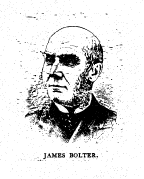
|
Normally I do not involve myself in politics, nor in any other man's business but my own, which has plenty to occupy me, you can be sure. Back in '53 I served a short time on the Common Council of the City of Hartford, desirous to do some public service; but that was short-lived, and, I must say, filled with frustration. I was deeply concerned about what was happening to this city and this country. I saw a quiet, genteel, and refined city being transformed before my very eyes. The manifestations of this were in the construction of huge factories, the heavy demand upon capital resources that had formerly been available only to the most respectable citizens, the unbridled development (I shan't use the word "improvement" to describe such alteration) of hundreds of acres of good land, and the importation of great numbers of foreigners who, failing to make ends meet in their native land, now came to Connecticut to bring ruin to our economy.
It was at that time that Mr. Samuel Colt, a gunmaker in this city since '48, proposed to build an enormous armory South of the city, in what was then a beautiful and peaceful area, inhabited by wildlife and occasionally a respectful fisherman, some of whom had cottages there on the banks of the river. Not only did Colt propose to destroy the natural flow of the river by erecting a tremendous dyke, as has been done by the Dutch in their part of the world, not only did he plan to build a gun factory that would forever ruin the scenic views that were once there, not only did he plan to employ hundreds - thousands - who, thronging to this city from Catholic lands and who-knows-where, would soon be requiring the city to increase its vigilance over education, sanitation, upkeep of roads, and enforcement of ordinances; but he had the unmitigated gall to announce that he should not be required to pay taxes upon the full valuation of his property!
Then this upstart began to acquire the lands he felt he needed in the most unusual manner. Unable to buy it at speculation prices from the Hartford Bank, who owned quite a bit of it, he went to New York, borrowed funds from various unsavory persons, and bought as many notes of the Hartford Bank he could lay his hands on, and bursting into the bank president's office, his satchel bulging with the newly acquired notes, declared that he owned the bank and it would sell him the land at the "fair" price. Further, in order to dislodge Colonel Solomon Porter (a most respected citizen of this city, who, incidentally, was a competitor of Colt's), from the Colonel's small holding of forty acres, Colt rented premises near Col. Porter's to a madame of most objectionable character and occupation, driving down the property values in the vicinity. What a contrast between Colt's proposal, and that of Rev. Dr. Horace Bushnell, who planned a large and lovely park for this city and its new state-house, in order to preserve some of the harmony with nature that we once had in such great abundance.
Needless to say, I opposed these trends in uncontrolled and irresponsible industrial development, and labored to point out the truth of Colt's manipulations to the citizenry. I even wrote a lengthy article which the Courant published, explaining my position and the history of Colt's actions. I am afraid, though, that, as the Irish population increases in this city, so does the subscription list of the Times. It was getting to the point where my character was being attacked by the Times, and so, I bowed out of politics.
I do, still, worry about the future of our society. I cannot see how the establishment by Samuel Colt of an armory in England will bring prosperity to Connecticut, other than greater lining for the pockets of Mr. Colt himself. Further, in this time of great strife between North and South, it is unseemly for us to cast so much deference in the direction of one who manufactures the instruments by which we will slaughter each other - yes, he is now selling his famous arms to southern militia, for them to turn upon our own countrymen in defense of the "Slave Power." Samuel Colt would have us all bow down to his new order, but I for one, and my new employer the Hartford Bank for another, will not sing praises to his name!
Return to Contents.
REQUIEM
Samuel Colt died in January, 1862, at the age of only forty-seven. His funeral was, in the words of historian Ellsworth S. Grant, "the most spectacular ever seen in Hartford, Connecticut. It was like the last act of a grand opera." Colt's band played, hundreds of workmen with black crepe bands on their arms filed past the casket in Armsmear, and Colt's company of the 12th Regiment marched in review. Michael Tracy, the Irish coachman, walked Shamrock, Colt's favorite horse, behind the eight pallbearers, including former Mayor Henry Deming, and former Governor Thomas Seymour. Thousands looked on as the casket was taken to a private burial ground by the lake on the grounds of Armsmear.
Right up to the time of his death Colt had been engaged in his "latest work on 'Moral Reform,'" that is, making money. His estate, which he left to his wife Elizabeth, his son Caldwell, and the son of his convicted murderer brother (whom many said was actually his own son by the woman Colt had brought to prison to marry his brother shortly before the execution), was valued at $15,000,000, an incredible fortune at that time.
Lydia Sigourney, a well known poetess in Hartford in those days, composed the memoriam which appears on the following pages and was handed out at the funeral. Following that is an excerpt from Ellsworth S. Grant's book The Colt Legacy: The Colt Armory in Hartford 1855-1980 (Providence, R.I., 1982). How would you assess the character and career of Samuel Colt?
The First Tycoon
by Ellsworth S. Grant
(used with permission of the author)
Colonel Samuel Colt had adopted as his motto Vincit qui patitur, "he conquers who suffers." But a better-fitting key to his character is found in a remark he once wrote to his half-brother William. "'It is better to be at the head of a louse than at the tail of a lyon!'...If I cant be first I wont be second in anything."
Colt's ambition was to be first and best, and his means were money and power, both of which he had in full measure. His patriotism, while stronger than that of the average munitions maker, was ever subordinate to his desire to see maintained a commercially favorable status quo between North and South. Colt was not above using bribery and was unashamed of profiteering; he seldom reflected on the moral implications of dealing in weapons of death and destruction.
In fairness, Colt was not alone in his evident amorality; the turbulence of the age had thrown out of focus more than a few of the old values for more than a few of his countrymen. Especially to Connecticut Yankees, who had made their state an arsenal for the nation since colonial days, gunmaking could be no sin. What did bother the diluted Puritan conscience of Colt's time was that a Hartford aristocrat flouted the tenets of the Congregational Church to which he was born - by a bizarre career, a love of high living, and an overbearing pride and flamboyance.
It can scarcely be denied that Sam Colt was one of America's first tycoons, a Yankee peddler who became a dazzling entrepreneur. The success of his many mechanical inventions and refinements was due less to their intrinsic merits - which were considerable - than to his showmanship in telling the world about them. He achieved his goals despite continual adversity for nearly three fourths of his short life. Proud, stubborn, and farsighted, he was a man apart; he was impatient with the old ways, preferring, as he said, to be "paddling his own canoe."
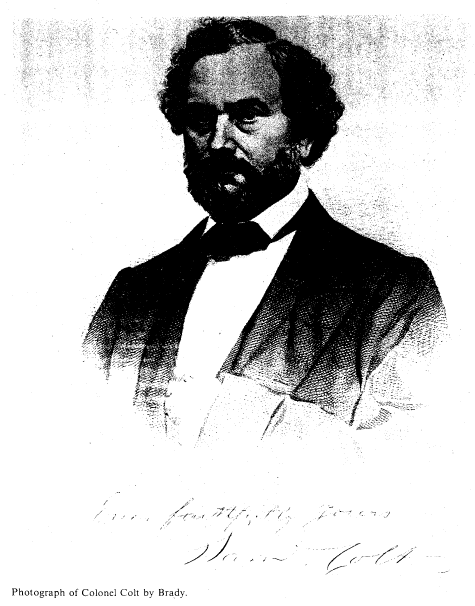
Return to Contents.
The "Laboring Class"
In 1873 the Connecticut state legislature decided that Connecticut society and economy were changing significantly and that it was time to collect some information with which responsible decisions about the future of the state could be made. Therefore, they created the Bureau of Labor Statistics to study the working and living conditions of "the laboring class," and to report relevant information to the legislature. The Bureau made its first report in the spring session of 1874. The first two charts on the following pages are from that report.
The last chart in this set is taken from a study done by Alba Edwards in 1903, entitled The Labor Legislation of Connecticut and published for the American Economic Association. At that time the legislature was reviewing its policy of the past quarter-century in light of the growth of organized labor protest and the increasing number of strikes and other labor disturbances around the turn of the century.
As you study these charts, see if you can imagine how a worker at a Connecticut factory lived. What could a worker afford? What if members of his family worked? What sort of hours did people work? What free time did they have left over?
After you have done this imagining, think about what questions come to mind. What do you need to know more about to understand the lives and working conditions of factory laborers in Connecticut? What questions do the charts raise about changes that are taking place in Connecticut? What ideas do you have already about the answers to these questions?
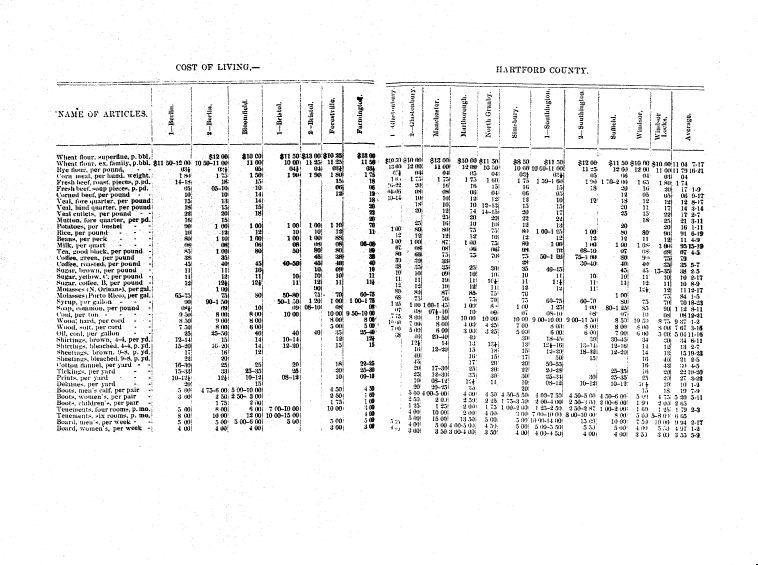
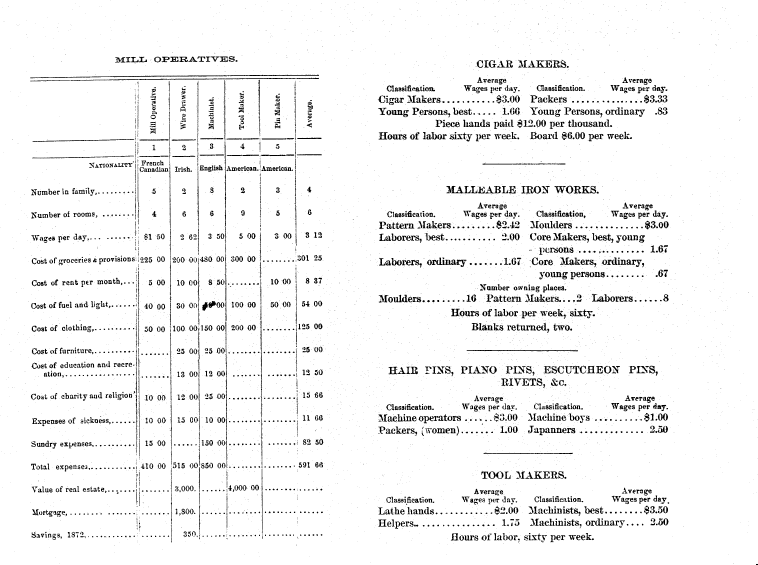
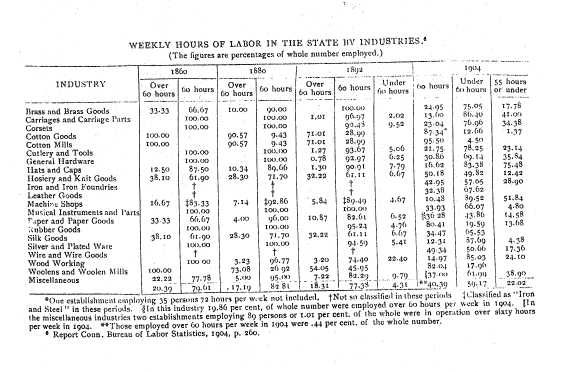
Return to Contents.
Wages and Profits
This document consists of excerpts from the report of the Connecticut Bureau of Labor Statistics for the year 1885. The authors discussed the issue of wages, often quoting from workers they had interviewed. Attached also are the charts they refer to in the text.
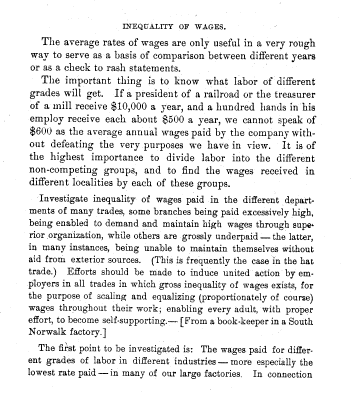
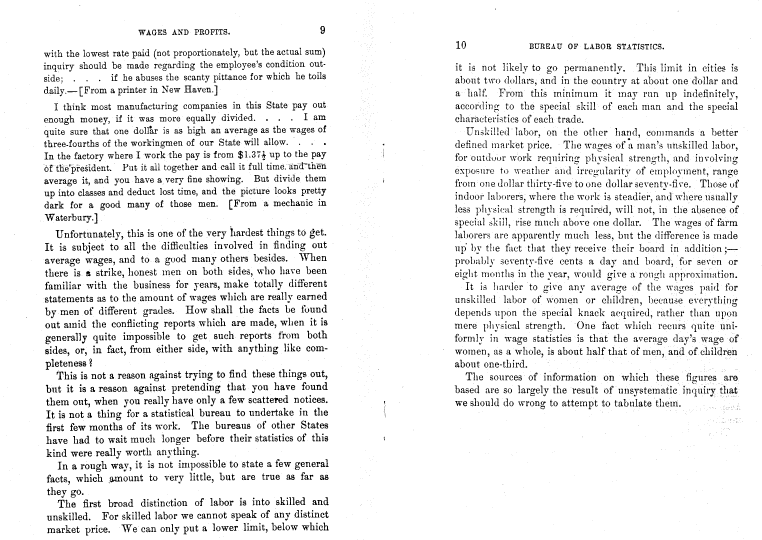
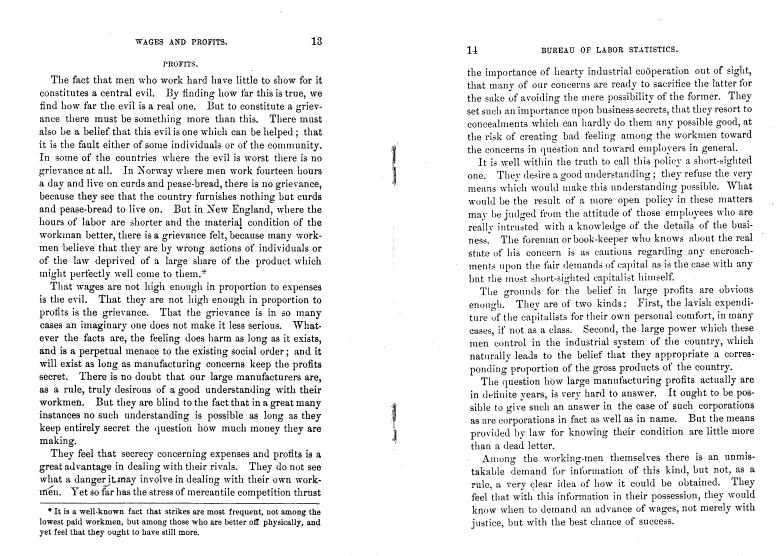

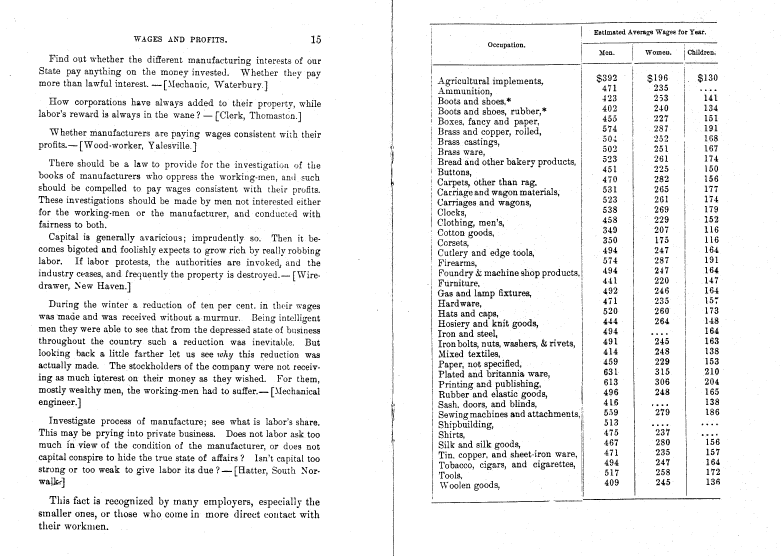
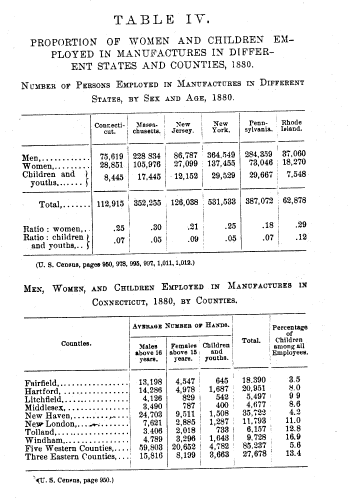
Return to Contents.
A Strike at Cheney Brothers
The year was 1902, the place, Manchester, Connecticut, a mill town famous for its association with Cheney Brothers, one of the largest silk manufacturers in the nation. The event was a strike by 250 members of the newly formed chapter of the Textile Workers Union of the American Federation of Labor.
In other places around the country, and around the state of Connecticut, such an event might not seem surprising at this time in American history. All across the nation workers suffered under horrible working conditions, any gains in their real wages being swiftly outpaced by the rising cost of living. Children, working twelve hours a day, seldom saw a blackboard, and families huddled together in squalid tenements. Meanwhile their managers and the owners of the mills in which they worked proclaimed the greatness of America as the GNP and their profits grew by leaps and bounds. But South Manchester was supposed to be the exception.
In South Manchester the Cheney brothers, entrepreneurs, technicians, inventors, and master administrators, had developed an industrial utopia - an oasis of caring and benevolence in the vast desert of industrial indifference. As they built their business from its small beginnings before the Civil War, they devoted as much energy to its surroundings as they did to its profitability. They built cottages, not tenements, for their workers and their families; in 1869 they built Cheney Hall as a cultural and social center for employees; they had the lawns and walkways around their houses and factories and the workers' houses manicured and open to the enjoyment of all; they supported a school and a fire department; provided sewers and garbage collections; banned liquor from the mill district; and set up a benefit association to provide pensions, death benefits and compensation to injured workers. It was a proud establishment, producing quality merchandise at a price that competed with the best in Europe, and enjoying pleasant relations with its employees, many of them immigrants from Ireland, Sweden, and Germany. By the end of the 19th Century, Cheney Brothers was at the height of its success, and its patriarch, Frank W. Cheney, had amassed a considerable fortune in spite of his inclination to spend a good deal of his income on community projects. The following document is excerpted from Henry Roland, "Six Examples of Successful Shop Management." Engineering Magazine XII (November, 1896), pp. 270-285, and provides a good sense of how the economic community viewed Cheney Brothers prior to 1902.
In 1841...Charles, Ward, Frank, and Rush Cheney came back to the homestead in South Manchester a little less than even with the world, so far as money was concerned, - the youngest of them at that time about thirty-five years of age, - to begin the manufacture of sewing silk on the smallest possible scale, and with great difficulty, and, as events have proved, to lay the foundation of one of the largest and most successful silk manufactories in the world....Two of the four brothers still survive, - old men, no longer in active direction of the affairs of the mills, which are now conducted by their sons, each of whom, after completing his education (always thorough in a chosen line and often including college graduation), takes the lowest place in some department of the mills at the lowest wages paid in that department, and advances only as his ability and actual worth to the concern warrant. There are to-day eighteen of the Cheney name in the establishment, which is managed exclusively by Cheneys as in the days of the original mill.
....The Cheney mills at present have about eighteen acres of floor-space, are driven by 2,500 h. p. of steam engines, and employ about 2,500 hands, half of them women. The works, ornamental grounds, Cheney residences, and the workmen's homes occupy about 1,000 acres of ground in South Manchester.
....At first the "help" was exclusively of home production, and one of the most serious differences of opinion between the management and the hands came with the first employment of Irish girls. The "native born" held themselves high above "Irish Catholics," although there are no women in the world more industrious and capable, or more deserving of esteem for the exercise of all the virtues, than Irish girls. The principal trouble was over religion, the Yankee girl of forty years ago retaining a share of the Quaker-whipping, witch-burning, Puritan proclivities, and regarding a Roman Catholic with horror. All of this has disappeared long ago; the religions and politics of South Manchester are what might be expected in a mixed community of American, English, Irish, Scotch, German, and Swedish nativity. The management imposes no restriction of any sort upon its workers. There is no organization of labor, and "no representation of labor" in the business. Wages are paid almost wholly on the piece-work plan. For a certain prosperous year when times were "good," the average pay in various departments was as follows:
|
|
Males (per week)
|
Females (per week)
|
|
Raw Silk Winders
|
|
$6.00
|
|
Raw Silk Cleaners
|
|
4.25
|
|
Raw Silk Doublers
|
|
5.75
|
|
Raw Silk Spinners
|
$10.00
|
5.75
|
|
Raw Silk Twisters
|
10.00
|
5.75
|
|
Soft Silk Winders
|
7.00
|
6.30
|
|
Soft Silk Spoolers
|
|
5.00
|
|
Soft Silk Warpers
|
10.50
|
6.50
|
|
Soft Silk Warp twisters
|
18.00
|
|
|
Weaving Broad goods
|
11.84
|
8.80
|
|
Weaving ribbons
|
9.00
|
7.00
|
|
Designers
|
25.00
|
|
|
Card cutters
|
18.00
|
|
|
Dyers
|
9.00
|
|
|
Finishers
|
12.00
|
|
|
Laborers
|
7.50 to 9.00
|
|
The low pay was given as $3.50 per week.
In this year there were, out of 2,500 hands employed,
88 men obtaining weekly $10 to $12.
104 " " " 12 to 15.
96 " " " 15 to 20.
24 " " " 20 to 25.
46 " " " $25 and over.
The high women's pay was given in that year as, in the case of one woman, over $12 and under $15, the next highest being that of 37 women, whose wages were over $7 and under $8 per week.
These wages are, I believe, better than cotton-mill workers obtain, but not so great as to be very tempting to the mass of American toilers. Out of 2,500 hands the total number obtaining over $10 weekly is only 358, leaving, say, 2,242 paid over $3.50 and under $10 weekly. As about half of the workers are males, it seems likely that the average skilled workman's pay is not over $8 or $9 per week.
Some, not many, of the retired workers are pensioned. There are many hands in the mills who have been in service for forty years and over. The company owns about two hundred rented tenements of a very superior class; the rents vary from $5 per month up to $12 and $14. The tenements are widely-separated cottages. The difference in price is due mainly to location; there are "aristocratic" and "plebeian" workmen's quarters among the company's tenements, besides which nearness to the works and other considerations make some locations more desirable than others. In cases of hardship, such as sickness or long-continued short time, concessions are made, rents written off, and straight-out charity bestowed, although giving of money is very strongly deprecated by the management. "Once give out money, and you make a perpetual pensioner," was the way it was expressed.
"Any one can do what we have done," said one of the Frank Cheneys to me; "let any man, or two or three men, take any sound business, start small, do good work, and give their whole time and attention to the business, and put every dollar it earns back into the establishment, excepting only a fair salary for the actual work done by the managers, and they must succeed. That was all the Cheneys did: we have made no great or controlling invention; we have not originated any methods of startling novelty; we have kept ourselves informed; we have used what faculties we had; we have all lived right here, with our help about us, and treated them fairly. We do not pay high wages; we do not share profits; we have never heard of any plan which in our judgment would better our present course of operation. The children of our workmen often go into the mills. Some of our help goes away; most of it comes back, homesick. We encourage workmen to own homes. We sell land at from one to two cents per square foot, according to location. We have here in South Manchester a strong building and loan association, which has many of our workers among its members....Yes, we have had some disagreements; they cannot be avoided; but nothing has ever led to any serious trouble."
Another Frank Cheney believes that isolation is the principal cause of the harmony existing in the Cheney silk mills. This speaker very strongly favored prohibition [of sale of liquor].
The dwellings of the workmen are contiguous, and have a similar environment. The Cheneys themselves are contented to pass their lives in South Manchester, because they can nowhere else find so delightful a harborage. The workmen remain for the same reason, and because their time is full of light labors, with simple enjoyments in easy reach. Cheney Hall is a free assembly-room, with ample accommodations for gatherings of all kinds.
....It is extremely improbable that any "labor agitator" can ever succeed in "organizing" the workmen of such an environment as that which obtains in ...South Manchester. At South Manchester, when the Knights of Labor were at the height of their prosperity, a lodge was organized, but it died a natural death without the slightest interference by the Cheney management. There are too many agreeable social diversions at South Manchester to make the dreary mouthings of the professional labor agitator an attractive entertainment, and, without the professional labor agitator, the paid "walking delegate," the paid "committee of adjustment," and all the horde of labor parasites which subsists on labor troubles, organized strikes become impossible.
So why was there a strike just a few years after this article was written?
Cheney Brothers management had decided the winter of 1902 that they could not beat the competition unless the workers increased their productivity. Therefore, they adopted a plan to have each of the weavers in the factory operate two looms at once, instead of one. The weavers walked out on March 25, 1902. The company decided to hold off on the new plan, and the workers returned to the mill in the spring. In July, the management again insisted on the two-loom plan, and the workers struck again, marching in noisy procession to the chant of "Two looms! Two Looms!"
In the fall, the weavers, by then well organized and drawing support from other workers at Cheney Brothers, successfully dominated the local Republican party caucus, and, in the election, saw their candidates chosen as first and second selectman, and Representative to the State Assembly. Still, the company refused to negotiate with any of the unions that had formed, and the town (and towns all around) were stunned by the bitter transformation that had occurred in South Manchester.
The documents included here are taken from a local newspaper, and reflect the agony felt by the workers and the people of Manchester as the tensions of the modern world exploded at last in this last bastion of paternalism. Is there enough evidence in these documents to determine who was in the right in this conflict? Had Cheney Brothers become just like any other textile manufacturing operation? How did people of the community respond to the strike? What conflicting values are evident here? Is it possible that both sides could have misunderstood the other, as Rev. Biddle suggests? What do you think of Rev. Biddle's solution? Why did "A Striker" think that politics was the answer? What hints are there in these documents of the impact of industrial growth on Connecticut communities, on general attitudes, and on workers - even when the industrialists are concerned about their impact on the world around them and the people in it?
[Documents from John F. Sutherland, "Strikes, Politics, and Sermons: Two Contrasting Views of Cheney Brothers Strike of 1902." Connecticut History 28 (November, 1987), pp. 58 - 67.]
The South Manchester News - Friday, September 5, 1902
LETTERS FROM THE PEOPLE
Workingmen of Manchester: the past year has been an eventful one for the town of Manchester. With strikes and the formation of unions has come more forcibly than ever before to our attention the fact that our town is part of the battlefield upon which is being fought the great conflict between capital and labor. There are enough evils at home which must be remedied without our looking abroad.
In as short a space as possible I would like to point to my fellow workmen the one sure way of fighting the class who are ever seeking to control that by which they have been protected in their schemes for their own aggrandisement - the ballot box.
You and I have participated in many a political campaign, full of enthusiasm and with but one hope, namely: whether right or wrong that the G.O.P. would be victorious. We paraded, carrying red fire and shouting ourselves hoarse, and our compensation was crackers and cheese and promises from the political spouters of prosperity and a "full dinner pail." Protection to home industries and the "honest dollar" were the only issues of any importance to us and we just simply voted to allow them to increase their profits at our own expense.
Did we ever think of voting protection for that which we have for sale in the market - our labor? No, and today while we are on strike our places are gradually being filled by imported cheap labor, the scuff and scum of Europe. We voted for the "honest dollar" and today we are getting a chance to earn it. We overlooked the real issue "an honest days work and an honest days pay." We blindly fought Bryan's doctrine of sixteen to one four years ago. Today we are fighting the unjust imposition of two mens work on one man for which he would receive but one mans pay. But experience is a stern teacher and I hope that the lesson taught will be beneficial to us.
You can, of course, remember the easily assumed campaign smile and familiar bow of politicians and employers which were as easily discarded when the election day had passed. What a farce our elections have always been in Manchester. The ring has everything cut and dried, plums picked and promised. At the caucus a willing tool is placed in the chair to preside, who rushes every nomination through, giving you no time to consider the names mentioned, with the exception of constables, and, of course such important officials must be given a full and careful consideration. They devoured the loaf and threw the crumbs to us to wrangle over, and it satisfied us did it not?
The doctors, and lawyers, and businessmen each took their turn at holding down a seat at the State Capitol and drew $300.00 per year for representing "your interests," and a prominent "Hon." was placed before their names. How well they were fitted and qualified to sit in a legislative body! Look up their records and read their eloquent speeches and pointed debates.
Workingmen, is it not time we gave these questions some thought? Is it not time that we stopped parading and carrying red fire and pictures of the full dinner pail, and used our brains, so that we may wisely, properly, and conscientiously perform that duty which we owe ourselves? The proper way to fight corporate greed is with the ballot. The vote of the poorest workingman has as much weight as that of the richest mill owner. It is in our power to redress the injustice under which we suffer. Send men to the legislature who understand what it is to earn a living under the conditions that you have to contend with - and who understands them better than a laboring man? Do not say that they are incapable. I know of no brain trust. Let us choose our town officials from our ranks. The town has paid a pretty good bill to educate some of those now in office. Why can not we put men in power who have at least a will of their own and are not afraid to stand by their own convictions? Are they not worth educating? We can make our community a model one if we will. If a government is venal and corrupt, the masses have not proved themselves capable of appreciating any better government. It can be made subservient to the general interests of the people. With more intelligence and interest among people, the officials would be made to feel a greater responsibility to and a great deal more consideration for the real source of power - the people.
To quote a prominent writer: - "Intelligent criticism among an intelligent people who do the voting would be a terror which no official could withstand."
We have not had enough interest in the things of vital importance in the past. There has not been enough intelligent criticism, but it was not because there was no occasion for it. Many mistakes have been made because of this lack of interest, and as an example I mention our failure to build and own our own schools. Fellow citizens, it was a grave mistake. Education of the future citizens is of too much importance to be placed in the hands of any corporation to be given as charity. The great social questions must be dealt with by a future generation and the settlement of these questions will depend upon the intelligence of the citizens. Our children can be educated to be humble and willing slaves or they can be educated to be intelligent men and women who will not be afraid to assert their rights and defend them. Do not neglect or lose sight of the public schools, for with them lies the future of our Republic.
It was pleasing to see placards that were carried Labor Day by the striking velvet weavers. "The men are thinking." "Municipal ownership." "Free text books for our public schools," etc. These should become a reality. It has been accomplished elsewhere, why can it not be here? Why cannot we fall in line with Haverill, Mass. for instance? Or to come nearer, look at what the workingmen of Hartford have done.
I am not in favor of organizing a new party. It is unnecessary. We can set the politicians out with wings clipped as an example of what a discontented but awakened community can do.
There is no position which cannot be filled by men who will use their office for the public good and who will not toady to anyone. Turn the present lawyers out and give the younger members of the profession a chance. They will perform the duties as well and better, because they can rely upon those who placed them in charge and can deal out justice to rich and poor alike. A striker can then get a warrant for the arrest of a mill-owner as well as the mill-owner getting one for him. We can give our present office holding lawyers a chance to write a history of Manchester, and they may devote as many pages to the 5th day of August as they please, the same to include their speeches in full which they recently delivered in the Town court.
Fellow citizens: there is so much that should be done that I cannot take the space to mention all, but one thing is certain, as long as we clothe the officials with power and lick the hand that lays the burdens upon us, we will never have our proper weight in government, and ought not to have.
Give the coming election the importance it should have. I believe the working men of Manchester are somewhat better than "damned fools and damned cowards." I hope they will prove themselves to be intelligent citizens and cast their ballots right on election day.
Yours sincerely,
A STRIKER
The South Manchester News - Friday, October 31, 1902
Mr. BIDDLE'S SERMON
ABLE AND DISPASSIONATE REVIEW OF THE LABOR TROUBLES THAT HAVE HARASSED THIS COMMUNITY FOR THE PAST SIX MONTHS
HE PLEADS FOR PEACE, GOOD WILL AND THE RESTORATION OF CONFIDENCE BETWEEN EMPLOYER AND EMPLOYED, AND EARNESTLY EXHORTS ALL CONCERNED TO SET ASIDE ENVY, STRIFE, VINDICTIVENESS, ARROGANCE, AND THE DISPOSITION TO INFLICT PUNISHMENT OR SEEK REVENGE
At St. Mary's church last Sunday morning, Rev. J.A. Biddle, the pastor, delivered the following dispassionate and able sermon on "The Deplorable Condition of Our Town and Our Duty Towards It."
Rev. Mr. Biddle took for his text: James iii:16. "Where envy and strife is, there is confusion and every evil work." He spoke as follows: -
How obvious and commonplace are these words. Of course where envy rules, where strife abounds, confusion and discontent follow. Every evil work grows out of such evil soil, as naturally as weeds in the garden. Good works cease, social degeneration begins, death ensues. Everybody knows this. Envy and strife will kill any community which they rule. Of all calamities that can befall our town, bitter envy and strife are the most deadly. The fires of hate burn on so long, the lust for revenge is so hard to satisfy or remove. He who stirs up this evil spirit is infinitely worse than he who burns a city. Peace is what we want, what we must have or no good can come to us.
It is to me inexpressibly pitiful that the conditions of our community so naturally suggest the words of my text. But we may as well with shame confess the disgraceful fact. Arrogance, intolerance, envy and strife have been the controlling moral forces of our town for the past six months. Brotherly love, sweet reasonableness have been far from us. The dove of peace has found no place to rest her feet. And the question uppermost in our minds has not been, how can we bring back the old reign of charity, confidence and good fellowship, for which we have been noted. We have been too ready to fight to gratify our evil spirit of revenge. It is still in too many hearts to make somebody suffer. Herein, O friends and fellow citizens, is the most deplorable feature of this sad business. The loss of money, as large as it is, is of small consequence compared with the loss of confidence in each other. That has been the chief glory of South Manchester. Of course we have been prosperous. Such communities as ours has been will always prosper. The employers have grown rich, year by year they have enlarged their manufacturing plant and enriched this town. Year by year the employees have improved their conditions. It would be difficult to find anywhere else so many beautiful homes with tidy lawns and well dressed children. It has been our boast that in South Manchester, no industrious, sober, honest man need be poor. Our educational, social and religious advantages have been as abundant as our industrial. We have always thought we had a corporation that had a soul whose interest was absolutely identified with the interests of the whole community. We have believed that our working people as a class were the equals in intelligence, skill and industry of those of any community in the land. So we could prosper. And we have prospered. We have grown rich together because we have pulled together.
Social Plague
But now the social plague of envying and strife have come to us also and we have been compelled to witness strange, unnatural, unchristian scenes. Hundreds of strong, industrious men have been idle. They have thronged the streets brooding over their wrongs, and meeting daily to carry on war against their employers. The great mills are silent and industrial war is on between the men and the company. Those who should be the warmest friends are bitter enemies. Angry threats and words are heard. Violence follows. Strangers are brought in to take the place of the old workmen. They are met with persuasion and threats. They are followed to and from the mills with angry taunts. They are denied the right to work for their bread, that right which we supposed lay at the base of our modern industrial system. Their boarding house is assailed at the dead of night with stones and pistol balls. The proprietors of the mills are themselves assailed and insulted upon the streets. They retaliate by arrests and injunctions. Beautiful homes are broken up. Families are compelled to leave houses in which they have lived in peace for years. First class workmen who have always been faithful to the interest of their employers, who have put their hard-earned savings into homes of their own, are refused work and compelled to leave town. The whole community is involved, class is arrayed against class in town politics. The old, natural leaders are set aside. New men of less experience and interests are brought forward. The businessmen find their trade falling off and their bills going unpaid. The ministers, those natural advisors and peacemakers, are given to understand that their advice and services are not wanted. Strangers are listened to upon the streets preaching old worn out fallacies about capital and labor. Brotherly love and trust give way to hate, and suspicious intolerance of opposition rules. Old friendships are broken, long-time neighbors pass each other with no sign of recognition. So the weary months go on while no efforts are made to bring about a reconciliation. We who have had a just pride in our beautiful, prosperous community have been compelled to be helpless spectators of this heartbreaking tragedy. All speech was useless, for when passion is hot the best-intended words are misunderstood. But when we must speak it is with wonder that the words of the text suggest themselves, "Where envy and strife is, there is confusion and every evil work."
Now, however much we may differ as to the causes of this social condition, we must agree that it is altogether bad, unnatural and unchristian. No matter who is to blame, the community is disgraced, property has fallen in value, the fair name of South Manchester is tarnished. Some say the company were unjust in their demand, [sic.] others that the bosses were insolent and arbitrary in their methods, and others that the men were wholly to blame in their refusal to work. But we all say that the result of our doing is evil for us all. For my own part I have no idea that the company intended to be unjust. Justice has been their policy from the beginning. I do not believe that the men are fools and cowards. It would be difficult to find a more self-respecting, industrious and intelligent body of workingmen in any other mill in the country. It has seemed to me from the beginning that the whole sorry affair would have been avoided if the bosses and men had more confidence in each other's good intentions. The two-loom experiment was not the cause, but the occasion of the strike. The cause was distrust and suspicion between the bosses and the men. But be that as it may. This is the whole pain of my discourse. When the smallpox breaks out the duty of all men is to unite in ridding the community of the pest. We do not stop and quarrel over the cause.
Awful Calamity
The community is victim of a social plague. These scenes we have witnessed are the symptoms. The duty of all is to unite in confession that it is a disease and take instant measures to stamp it out. It is an awful calamity for the workingman to be arrayed as a for against his employer. [sic.] The most cordial relations of trust should exist. It is an infinite misfortune to the community to have the poor arrayed as enemies. If good can come to either party they must cooperate. No good can come when the laboring men must band together to protect themselves against the exactions and oppression of the capitalists. It may be a necessity, but it is a sad necessity. It means social war; it ends in social tyranny and social death.
It is altogether deplorable when for any cause the common people have lost confidence in those who through superior wealth, or power, or intelligence should be the natural leaders in the affairs of the community. Now all these calamities have come upon us and there are many who seem to rejoice over it as a sign of progress. There are those who would make political capital out of organized labor. Others would make war upon the labor unions. But it is not in such a spirit we must reach this tremendous industrial problem, if we ever hope to solve it in any satisfactory fashion. The only practical solution of the labor problem is to cultivate confidence, brotherliness between the capitalists and the laborer. When that abounds the problem is settled as perfectly as it can be in this world of toil. So long as Cheney Brothers and their men believed in each other and trusted each other, we had no labor problem. Case Brothers of Hyland Park have no labor problem in their paper mill. The problem appears so soon as the capitalist becomes arrogant and greedy or the laborers become unreasonable and vain. But all this vaporing about the natural antagonism between capital and labor or the necessity of labor organizing to free itself from capital is only aggravating the plague and it is only bad wind. There is no natural antagonism between capital and labor. They are two necessary forces in any industrial system. Together they may solve the bread-and-butter problem. Separation means poverty to all. "God almighty married them and woe be he who tries to divorce them." The laborer cannot, and must not try to free himself from the capitalist. You may free yourself from Cheney Brothers, but wherever you go for work you will be compelled to serve some capitalist. You see the man who has money and brains and the man who has muscle and brains must work together or both will starve. It has always been so and always will be.
Rule for Industrial Success
So the obvious thing for both to do is to be friends, work together, cultivate relations of mutual confidence and helpfulness. When these have been established and maintained envy and strife cease, prosperity comes, good wages and dividends make both parties glad. After all it is in this industrial world as in all others, everything depends upon the men who manage the capital, the man who do the labor. [sic.] If they are all right, good friends, capital and labor will walk together in peace. This is the only message we have to capitalist and laborer. Be friends, cultivate relations of mutual confidence and brotherliness. Bear with each other. Learn to believe in each other.
Why should we do otherwise? We shall never settle this problem by war or force. As a rule, if the laborer works to give his employer large dividends the employer will work to give the employees large wages. If you will fight your employer, he will fight you, and as you are the weaker you will always get the worst of it in the end. So it has always been, and so it will always be. Let us begin to see the good in each other and the blessings we have. Think how much we owe Cheney Brothers and how much we need each other. After all, as a class the capitalists of America are not as a rule an exacting set of men. Those I have known, and my acquaintance is wide, have been men just and humane. The hard, cruel master has been the exception. Certainly in our town we have never before at least had any serious reason to complain of our capitalists. They have always worked for the interests of the community and of the employees. I do not care where you go I doubt if you will find a company that intends to be more just and humane than Cheney Brothers. Their large, airy, well lighted mills do not look like the work of greedy capitalists who wish to grind the faces of the poor.
American Working Peoples Condition
As for the workingmen of America, I have lived among them and worked with them for thirty years and I have not observed that they were particularly oppressed or downtrodden as some orators have described them. I have seen much hardship among them, but most of it came, not from low wages, but from extravagance and drunkenness. They had wrongs, but the American people have sought to right their wrongs by legislation as far as they can go. Whatever may be the cause elsewhere, certainly we of South Manchester have much to make us rejoice in our lot. Look at the homes of the working people. Do they look like the homes of slaves? Go into them. See their large rooms, their oak furniture, their organs, carpets, pianos, and bathrooms. These are not the possessions of those who are ground down by the oppression of capitalists. We have enough and more than enough to make life pleasant if we will only sweeten it with a contented mind, a thankful spirit and loving heart. Of course life is hard sometimes. Our tasks are difficult, our pay is small. But so it is everywhere. Let us not make it harder by adding to the natural burdens of toil the heavier burdens of discontent, strife, envy, arrogance, revenge and greed. After all, the best things in life are not money and houses, rich garments and splendid furniture, but friends, kind neighbors, good fellowship. Let us work for these and all else shall be added unto us.
By mid-October, 1902, many of the velvet weavers had returned to work at Cheney Brothers. Those who still held out saw their positions being filled by people being brought in from outside Manchester. On the 17th of that month the remaining strikers voted to end the walkout. Back to work they went, to run two looms at once. It was not until thirty years later that Cheney Brothers had another labor union.
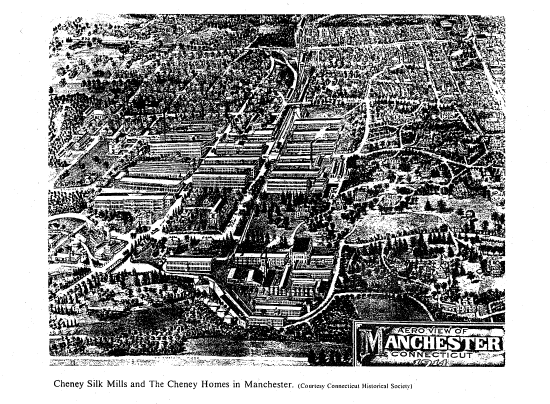
Return to Contents.
The Growing Labor Movement
There were numerous "labor disturbances," besides those at Cheney Brothers, in 1902. In these excerpts from the report of the Bureau of Labor Statistics for the year ending November 30, 1902, the state government took note of these protests, and published, as well, a brief summary of the labor union movement in Connecticut until that year.
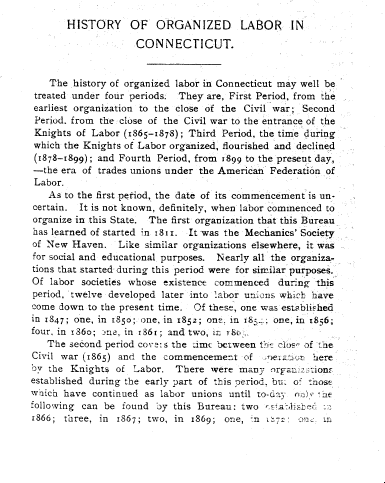


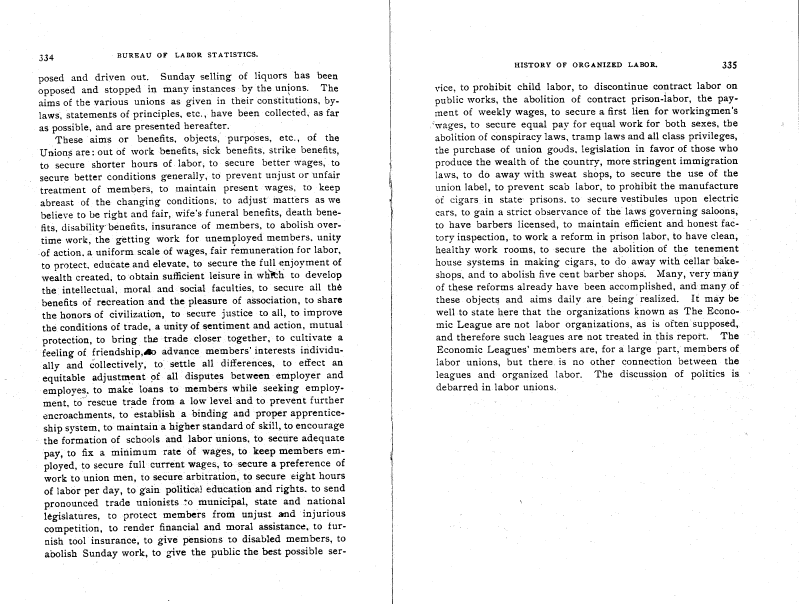
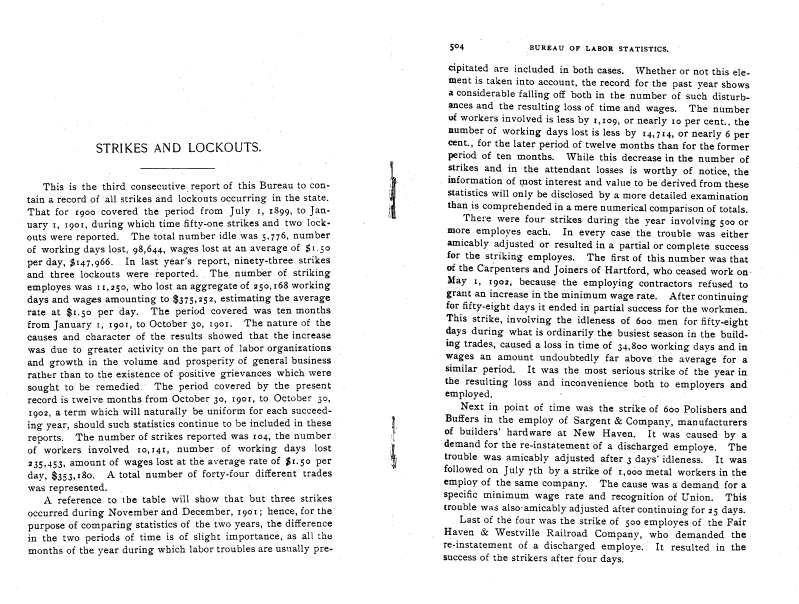
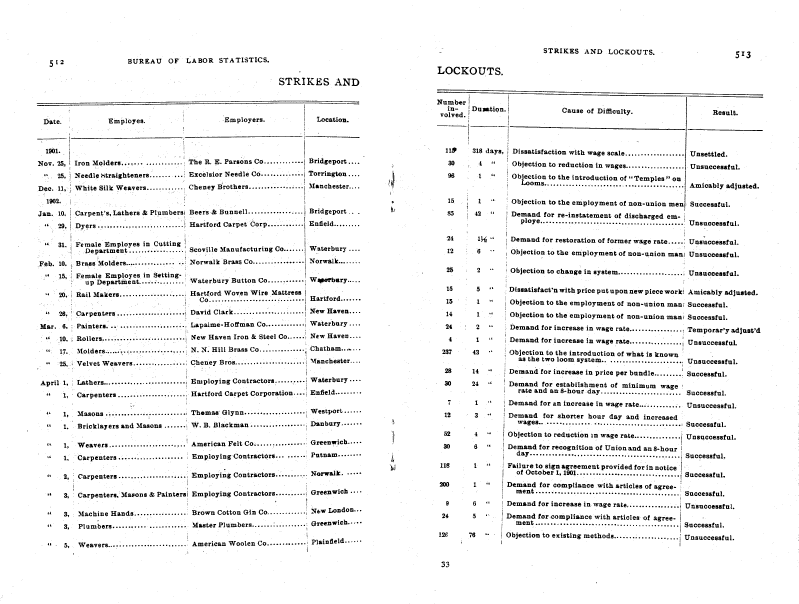
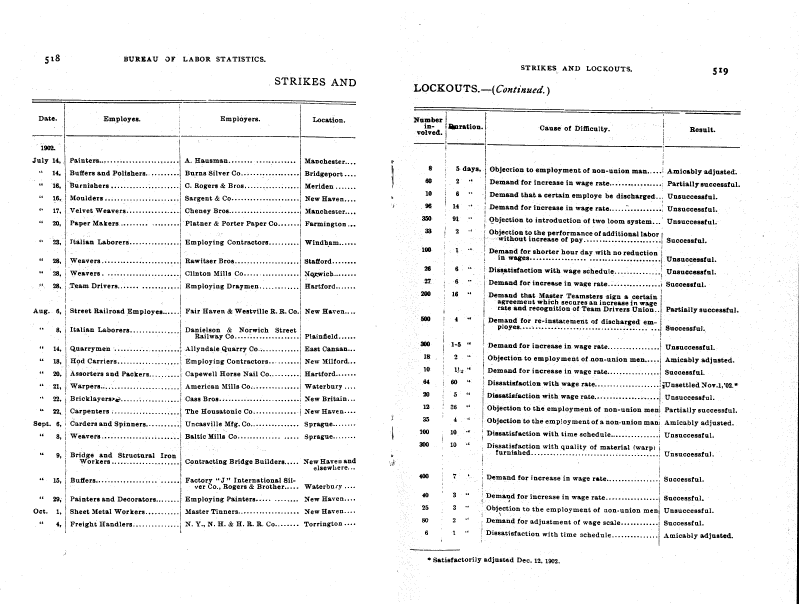
Return to Contents.
Working Women
The Numbers Involved
The chart below is taken from Alba Edwards, The Labor Legislation of Connecticut, a study done in 1903. The author was reviewing child labor laws when she presented this chart. What are the implications of women and children working for the growing labor union movement in Connecticut? What sort of industries are likely to be employing the greatest number of women and children?
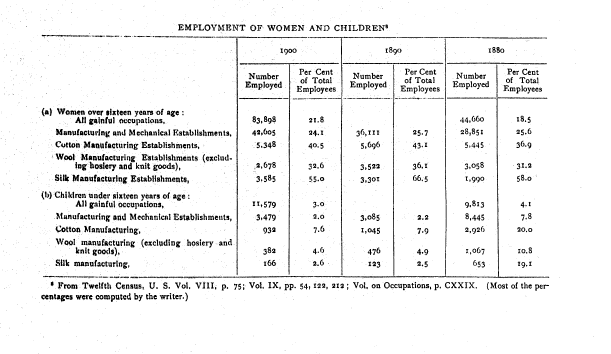
Interviews with Working Women
This page was taken from a report by the Bureau of Labor entitled The Conditions of Wage Earning Women and Girls, published by the state government in 1916. Most of the women interviewed were sales persons in department stores.

On Strike!
The following articles are from a collection of newspaper articles on labor in the early 20th Century typed up by the Works Progress Administration during the 1930's and placed in the Connecticut State Library (Record Group 33, Boxes 199-200).
"Lose anything?" repeated one girl, who had been out 3 weeks, when asked the same old question. "Sure I lost something. I lost seventeen good cold dollars. I'm the captain of the pickets at one of the shops you know, and if we people who are supposed to furnish an example don't stand to lose something where will the others get off? Of course we need the money at home. Do you think a girl would work for $5.50 a week if the family didn't need the money? I'd be at high school only there are seven in our family. My father is working, also one of the boys, but rent comes due the first of every month and we have to hump to keep things going. Sure, I'd rather stay out than go back for the same money and folks at home agree with me. They tell me to stick it out, and I guess I'll stick. Look what we can do if we get eight hours. Have a better sleep, come home earlier at night, take our time about getting ready to go out, and feel as though we are human beings with real names instead of parts of machinery turning out electric switches. No more ten hours for me even if I need the money. I'll work in some other town or do something.
"Some of the girls from another shop went back but not in ours. We pickets have been on the job. Of course, it gets rather tiresome, but don't you see a girl is a girl. After working all day we are tired out, and if we go anywhere in the evening, the next morning we wake up tired. Girls have to have some kind of entertainment, and what in the world can we do on $7 a week or less. I'd like to see some of the folks who talk about us try to enjoy a five cent movie and smile. How is the strike going to end? Search me. We will stick it out as long as we can. After that good night! But say, if you put anything about me in the paper don't get fresh and don't put in a pack of lies as some of them."
"It's a funny game," another said. "We went out on strike because we thought we could get something. It is over four weeks now and my $7 a week is lost for that time. But that isn't what makes me sore. The man who persuaded me to go out and told me I would be foolish if I didn't is back at work again and getting his regular pay. I don't call that a square deal. I have looked around the other shops, but I couldn't get anything to do. I am living home and that helps me out some, but still they need the money there. As for going back to work, I'd never go back to the same shop for more money even. Before we went on strike the boss was making it kind of mean for me and if I should go back I know he'd make it worse, I don't know what to think.
"Sometimes I have an idea we are on the right track, and then again I don't think we went at it in the right way. It doesn't seem that the men who own the shops really know how cheaply some of the help are paid. Guess the best way out of it is to go right along and see how things will turn out. But say, I certainly would like to have one of those jobs where a girl would have an afternoon or a few hours off now and then without punching a time card or losing twenty-seven cents for three hours work."
"I'm sick of wrapping up electric switches and I wish some nice guy would come along," said another striker. "I guess it's me for out-of-town, where I can work eight hours. I have been on strike for over three weeks and it's still the same old waiting game, and with the money needed at home I ought to get busy. But no more ten hour shops for me. I have a father who can't work and the only money coming in at our house which does not amount to an awful lot. I got $6.05 a week, working in the shop, so you can figure out for yourself how much I lost. I'll stick with the rest of them as long as I can, but we girls ought to have something in prospect besides ten hours a day all our lives.
"If you want to know one of the reasons for the strikes look on the front page of your papers for a few nights and read how a new factory is paying dividends, other million dollar corporations being formed and the advances in the stock market. We want them to spread some of this stuff around."
From a November 7, 1915 Hartford Courant:
If students from Trinity College are working as "strike breakers" at Hart & Hegeman factory, a determined effort on the part of the girl strikers will be made to stop them tomorrow afternoon. It was announced yesterday by Pres. Sol Southeimer of the Central Labor Union that the striking girls had secured the sympathies and services of several Trinity men, who would assist them in picketing Monday. These men, it is believed will have influence enough on the Trinity boys to induce them to leave their recently acquired places.
Mrs. Mary P. Scully, the woman labor organizer, said yesterday that she had heard students about eight in all started Friday afternoon at 20 cents an hour. Mrs. Scully was rather bitter in her denounciation of the Trinity men, who, she said, study sociology and wonder what makes the world so miserable and then aid the misery by acting as strike breakers.
Return to Contents.
